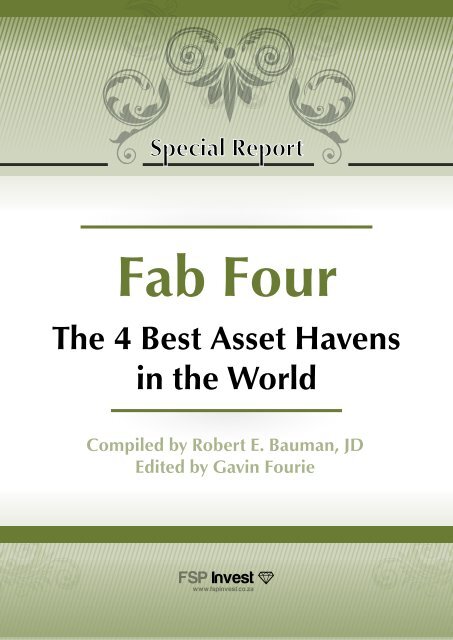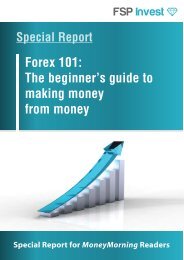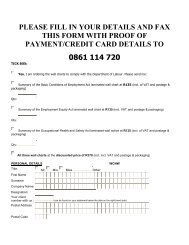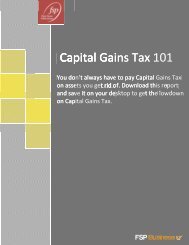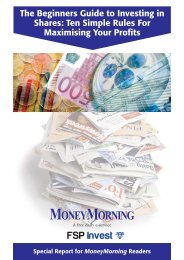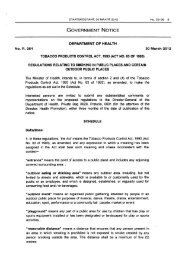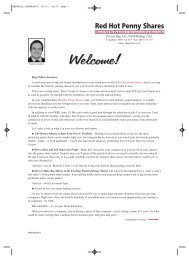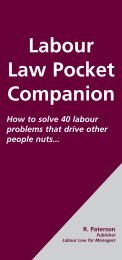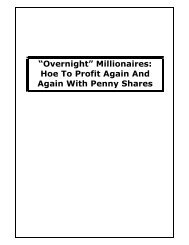The 4 Best Asset Havens in the World - Fleet Street Publications
The 4 Best Asset Havens in the World - Fleet Street Publications
The 4 Best Asset Havens in the World - Fleet Street Publications
You also want an ePaper? Increase the reach of your titles
YUMPU automatically turns print PDFs into web optimized ePapers that Google loves.
Fab Four<br />
<strong>The</strong> 4 <strong>Best</strong> <strong>Asset</strong> <strong>Havens</strong><br />
<strong>in</strong> <strong>the</strong> <strong>World</strong><br />
Compiled by Robert E. Bauman, JD<br />
Edited by Gav<strong>in</strong> Fourie
Fab Four - <strong>The</strong> 4 <strong>Best</strong> <strong>Asset</strong> <strong>Havens</strong> <strong>in</strong> <strong>the</strong> <strong>World</strong><br />
Special Report: Fab Four, <strong>The</strong> 4 <strong>Best</strong> <strong>Asset</strong> <strong>Havens</strong> <strong>in</strong> <strong>the</strong> <strong>World</strong> is issued and approved by <strong>Fleet</strong> <strong>Street</strong> <strong>Publications</strong> (Pty) Ltd.<br />
Copyright © 2012 <strong>Fleet</strong> <strong>Street</strong> <strong>Publications</strong> Pty (Ltd). All rights reserved.<br />
Note that FSP Invest, a division of <strong>Fleet</strong> <strong>Street</strong> <strong>Publications</strong> (Pty) Ltd, is a research house and not a registered broker or f<strong>in</strong>ancial advisor. <strong>The</strong> <strong>in</strong>formation conta<strong>in</strong>ed<br />
<strong>in</strong> our correspondence, programs and publications does not take <strong>in</strong>to account <strong>the</strong> <strong>in</strong>vestment objectives, f<strong>in</strong>ancial situation and particular needs of any particular<br />
person and is not to be construed as personalised <strong>in</strong>vestment advice <strong>in</strong> terms of <strong>the</strong> F<strong>in</strong>ancial Advisory and Intermediary Services (FAIS) Act of 2002. Although we<br />
may answer general customer service questions, we are not licensed under securities laws to address your particular <strong>in</strong>vestment situation. Any <strong>in</strong>vestments or trades<br />
mentioned <strong>in</strong> our publications should be made only after consult<strong>in</strong>g with your <strong>in</strong>vestment advisor or <strong>in</strong>termediary service.<br />
All FSP Invest’s publications are protected by copyright. Copy<strong>in</strong>g or dissem<strong>in</strong>at<strong>in</strong>g any <strong>in</strong>formation published by FSP Invest, electronic or o<strong>the</strong>rwise, is strictly<br />
prohibited. No part of this report may be reproduced by any means without written permission from <strong>the</strong> publisher.<br />
Please take note: We research our recommendations and articles thoroughly, but disclaim all liability for any <strong>in</strong>accuracies or omissions found <strong>in</strong> our publications.<br />
Should you have any queries or uncerta<strong>in</strong>ties, please contact <strong>Fleet</strong> <strong>Street</strong> <strong>Publications</strong> (Pty) Ltd on: Customer Services 0861 114 365.<br />
Registered office: <strong>Fleet</strong> <strong>Street</strong> <strong>Publications</strong>, Northlands Deco Park, Showrooms Stands 76-83, Units 6-8, Avant-Garde Avenue, Newmarket <strong>Street</strong>, North Rid<strong>in</strong>g.<br />
Registered <strong>in</strong> SA, Reg No. 1999/019170/07. Vat No. 4430185282.
Fab Four - <strong>The</strong> 4 <strong>Best</strong> <strong>Asset</strong> <strong>Havens</strong> <strong>in</strong> <strong>the</strong> <strong>World</strong><br />
Introduction<br />
Fab Four:<br />
<strong>The</strong> 4 <strong>Best</strong> <strong>Asset</strong> <strong>Havens</strong> <strong>in</strong> <strong>the</strong> <strong>World</strong><br />
FSP Invest has created this special report <strong>in</strong> response to member <strong>in</strong>quiries ask<strong>in</strong>g us for our op<strong>in</strong>ion on what<br />
are <strong>the</strong> best offshore havens.<br />
That is a difficult question to answer – because <strong>the</strong> correct response depends on <strong>the</strong> unique needs of each<br />
<strong>in</strong>dividual.<br />
Comb<strong>in</strong><strong>in</strong>g our 14 years of experience, knowledge and contacts… We’ve done <strong>the</strong> “what’s <strong>the</strong> best haven”<br />
research for you — and based on <strong>the</strong>se facts and our suggestions you can decide what best suits you.<br />
You may want to save this report for future reference.<br />
Throughout this report we repeatedly use <strong>the</strong> terms “tax haven” and “asset haven.”<br />
Those terms identify jurisdictions that have enacted favourable legislation to attract foreign <strong>in</strong>vestments and<br />
bus<strong>in</strong>ess. <strong>The</strong>se laws usually impose no taxes on profits from foreign <strong>in</strong>vestments or at <strong>the</strong> very least, tax<br />
profits at a low rate.<br />
<strong>The</strong>se haven laws also may make it difficult for creditors to collect foreign judgments aris<strong>in</strong>g from certa<strong>in</strong> types<br />
of contracts, such as a life <strong>in</strong>surance policy or annuity, or aga<strong>in</strong>st certa<strong>in</strong> legal structures, such as a trust or<br />
private <strong>in</strong>terest foundation.<br />
<strong>The</strong> cont<strong>in</strong>ued attacks on “tax havens” by tax hungry, welfare state tax collectors has caused some common<br />
terms to change. Most of <strong>the</strong> offshore places once known as “tax havens” now prefer to be called “offshore<br />
f<strong>in</strong>ancial centres” or some o<strong>the</strong>r more neutral term.<br />
To evaluate each haven, we use five criteria, all equally weighted:<br />
• government and political stability<br />
• favourable laws and judicial system<br />
• available legal entities<br />
• f<strong>in</strong>ancial privacy/bank<strong>in</strong>g secrecy<br />
• taxes<br />
While we do list a first place “w<strong>in</strong>n<strong>in</strong>g” jurisdiction on page 6 (It’s OK to peek!), <strong>the</strong> truth is, <strong>the</strong> “best”<br />
offshore haven, is <strong>the</strong> one that meets your own <strong>in</strong>dividual needs.<br />
Almost no jurisdiction can offer every <strong>in</strong>vestor or bus<strong>in</strong>ess all of <strong>the</strong> exact services <strong>the</strong>y may require. Offshore<br />
jurisdictions, like bus<strong>in</strong>esses, have learned to specialise to meet <strong>the</strong> needs of specific constituencies to which<br />
<strong>the</strong>y cater.<br />
For <strong>in</strong>stance, if you’re consider<strong>in</strong>g reduc<strong>in</strong>g professional malpractice <strong>in</strong>surance costs with an offshore captive<br />
<strong>in</strong>surance company, Bermuda is a top jurisdiction to consider, with <strong>the</strong> Cayman Islands a close second.<br />
However, Bermuda is less suitable for private bank<strong>in</strong>g. Its banks charge high fees and <strong>the</strong>re is no bank secrecy<br />
statute.<br />
Conversely, Austria is one of <strong>the</strong> world’s lead<strong>in</strong>g jurisdictions for private bank<strong>in</strong>g. However, if you are look<strong>in</strong>g<br />
for top-notch company formation and adm<strong>in</strong>istrative professional services, Austria doesn’t have an extensive<br />
selection from which to choose.<br />
In choos<strong>in</strong>g an offshore haven, you should also conduct your own thorough analysis of its political and<br />
3
Fab Four - <strong>The</strong> 4 <strong>Best</strong> <strong>Asset</strong> <strong>Havens</strong> <strong>in</strong> <strong>the</strong> <strong>World</strong><br />
economic stability, its legal and judicial environment and its political history.<br />
However, <strong>in</strong> almost every case, it’s more important to choose <strong>the</strong> right offshore professional service provider<br />
ra<strong>the</strong>r than <strong>the</strong> supposed right offshore jurisdiction.<br />
Indeed, our selection of choice havens has been significantly affected by our ability to f<strong>in</strong>d qualified f<strong>in</strong>ancial<br />
service companies with<strong>in</strong> each jurisdiction — proven and reliable professionals who can offer FSP Invest<br />
readers <strong>the</strong> best products and services <strong>the</strong>y deserve.<br />
How to Choose An Offshore Haven<br />
To beg<strong>in</strong> with, you should understand that each “offshore” haven is unique.<br />
A country that provides <strong>the</strong> best bank<strong>in</strong>g regulations won’t necessarily be <strong>the</strong> best place for <strong>in</strong>corporat<strong>in</strong>g a<br />
bus<strong>in</strong>ess, just as <strong>the</strong> best jurisdiction for privacy won’t necessarily be <strong>the</strong> best for an offshore trust. Yet, <strong>the</strong>re<br />
are general guidel<strong>in</strong>es for choos<strong>in</strong>g an asset haven that apply across <strong>the</strong> board.<br />
<strong>The</strong> follow<strong>in</strong>g eight issues are <strong>the</strong> most important considerations:<br />
1. Is <strong>the</strong> Haven a Completely Independent Sovereign Nation?<br />
Or is it a territory, dependency or colony of a larger country? While <strong>the</strong> government of a dependency or<br />
territory may enact favourable legislation to attract foreign <strong>in</strong>vestment, such legislation will be hostage to <strong>the</strong><br />
political and economic environment prevail<strong>in</strong>g <strong>in</strong> <strong>the</strong> mo<strong>the</strong>r country.<br />
2. Does <strong>the</strong> Haven Respect Privacy?<br />
And is privacy built <strong>in</strong>to its law? Under what circumstances can creditors or <strong>the</strong> government obta<strong>in</strong><br />
<strong>in</strong>formation about your wealth, or even seize it? It’s worth not<strong>in</strong>g that a sue-happy lawyer or identity thief,<br />
armed with noth<strong>in</strong>g more sophisticated than a personal computer, can <strong>in</strong> a few m<strong>in</strong>utes unearth a great deal<br />
of f<strong>in</strong>ancial <strong>in</strong>formation about whatever local assets you own as a prelude to plunder. This is <strong>the</strong> reason why<br />
strong privacy laws are a must <strong>in</strong> any haven that you might consider.<br />
Some countries have a tradition of secrecy but no legal requirements enforc<strong>in</strong>g it. O<strong>the</strong>rs have laws that allow<br />
<strong>the</strong> local government access to <strong>in</strong>formation while pretend<strong>in</strong>g that <strong>the</strong> government is sworn to secrecy.<br />
O<strong>the</strong>rs have bank-secrecy laws but frequently ignore <strong>the</strong>m, or have laws filled with exceptions. Ideally, secrecy<br />
should be built <strong>in</strong>to <strong>the</strong> legal code and violations of privacy should be prosecuted with civil or crim<strong>in</strong>al<br />
sanctions. From <strong>the</strong> standpo<strong>in</strong>t of <strong>the</strong> tradition and legal basis for bank<strong>in</strong>g secrecy, <strong>the</strong> four countries that<br />
stand out are Austria, Liechtenste<strong>in</strong>, Luxembourg and Switzerland.<br />
3. How Long has <strong>the</strong> Haven been An Offshore F<strong>in</strong>ancial Centre?<br />
A country like Switzerland with centuries of traditional respect and protection of privacy, or like Luxembourg<br />
with decades of stability, are unlikely to change for transient reasons. <strong>The</strong> longer and stronger <strong>the</strong> traditions of<br />
law and privacy, and <strong>the</strong> more stable <strong>the</strong> economy, <strong>the</strong> better chance that those traditions will be cont<strong>in</strong>ued.<br />
4. Do <strong>the</strong> Citizens Support <strong>the</strong> Haven’s Offshore Status?<br />
In some havens, <strong>the</strong> local citizens aren’t <strong>the</strong> primary beneficiaries of bank<strong>in</strong>g secrecy. S<strong>in</strong>ce taxes are low to<br />
non-existent and local legal eagles haven’t evolved <strong>in</strong>to predators, this means local residents have little <strong>in</strong>terest<br />
<strong>in</strong> privacy laws or bank secrecy.<br />
5. Is <strong>the</strong> Haven Important to Your Government?<br />
<strong>The</strong> United Arab Emirates, for example, enjoys <strong>the</strong> favour of almost all global governments because it’s a<br />
“friendly” nation <strong>in</strong> an unstable region.<br />
4
Fab Four - <strong>The</strong> 4 <strong>Best</strong> <strong>Asset</strong> <strong>Havens</strong> <strong>in</strong> <strong>the</strong> <strong>World</strong><br />
6. Does <strong>the</strong> Haven Wave a “Red Flag?”<br />
Public deal<strong>in</strong>gs with high-profile havens may raise a red flag <strong>in</strong> tax collector’s offices around <strong>the</strong> world.<br />
<strong>The</strong> Cayman Islands, Switzerland and Liechtenste<strong>in</strong> are examples. Panama and Austria are a step below that<br />
level. Bermuda is lower still, though it doesn’t offer <strong>the</strong> secrecy <strong>the</strong> o<strong>the</strong>rs do. But <strong>the</strong>n, any tax haven often<br />
upsets tax collectors <strong>in</strong> high-tax nations.<br />
7. How Efficient and Convenient are <strong>the</strong> Professional Services?<br />
Are competent personnel available to serve your needs? How well do <strong>the</strong>y speak English? How easy is it to<br />
visit <strong>the</strong> place? What’s <strong>the</strong> time difference between you and where you may want to do bus<strong>in</strong>ess offshore?<br />
Noth<strong>in</strong>g substitutes for personal contact with <strong>the</strong> people who you entrust with your assets. It’s best to visit<br />
your money periodically, and so much <strong>the</strong> better if it’s <strong>in</strong> a place that you enjoy visit<strong>in</strong>g.<br />
8. What Taxes are Levied on <strong>the</strong> Haven’s Users?<br />
<strong>The</strong> first requirement of a haven is to offer capital preservation.<br />
None<strong>the</strong>less, to <strong>in</strong>clude a haven country that scores heavily <strong>in</strong> capital preservation but also has high corporate,<br />
estate or o<strong>the</strong>r taxes, is to ignore an important consideration. True f<strong>in</strong>ancial security must <strong>in</strong>clude <strong>the</strong><br />
maximum possible tax avoidance allowed by law, <strong>the</strong> greatest possible f<strong>in</strong>ancial privacy, <strong>the</strong> highest level of<br />
asset protection and access to <strong>the</strong> most profitable <strong>in</strong>vestments available.<br />
Bottom l<strong>in</strong>e: You must select your haven nations accord<strong>in</strong>g to <strong>the</strong> relative safety and privacy such places<br />
guarantee by law.<br />
Offshore jurisdictions, like bus<strong>in</strong>esses, have been forced to specialise to meet <strong>the</strong> needs of specific<br />
constituencies to which <strong>the</strong>y cater. <strong>The</strong> “best” offshore haven is <strong>the</strong> one that meets your own <strong>in</strong>dividual needs.<br />
Almost no jurisdiction can offer every <strong>in</strong>vestor or bus<strong>in</strong>ess each of <strong>the</strong> services <strong>the</strong>y might need. So let’s meet<br />
<strong>the</strong> top four <strong>in</strong> <strong>the</strong> world.<br />
<strong>The</strong> <strong>World</strong>’s <strong>Best</strong> <strong>Asset</strong> <strong>Havens</strong><br />
In prepar<strong>in</strong>g this FSP Invest special report of <strong>the</strong> world’s top asset havens, we reviewed <strong>the</strong> laws, political<br />
stability, economic climate, tax situation, and <strong>the</strong> overall stand<strong>in</strong>g of dozens of different jurisdictions.<br />
We narrowed our choices down to four lead<strong>in</strong>g jurisdictions:<br />
1 Switzerland<br />
2 Panama<br />
3 Liechtenste<strong>in</strong><br />
4 Hong Kong<br />
Plus, we’ve listed some havens as “honourable mentions.” As we noted earlier, to evaluate each jurisdiction, we<br />
reviewed five factors:<br />
• Government/political stability: How long has <strong>the</strong> current system of government been <strong>in</strong> place? Is <strong>the</strong><br />
jurisdiction politically stable?<br />
• Favourable laws, judicial system: How long a tradition has <strong>the</strong> haven had? Does its legal and judicial<br />
system have a reputation for “fair play” with regard to foreign <strong>in</strong>vestors?<br />
• Available legal entities: Does <strong>the</strong> jurisdiction have a large enough variety of legal entities to satisfy <strong>the</strong><br />
average person seek<strong>in</strong>g an estate plann<strong>in</strong>g or bus<strong>in</strong>ess solution?<br />
5
Fab Four - <strong>The</strong> 4 <strong>Best</strong> <strong>Asset</strong> <strong>Havens</strong> <strong>in</strong> <strong>the</strong> <strong>World</strong><br />
• F<strong>in</strong>ancial privacy/bank<strong>in</strong>g secrecy: Does <strong>the</strong> jurisdiction have f<strong>in</strong>ancial secrecy laws? How strictly are<br />
<strong>the</strong>y applied? What exceptions to secrecy exist?<br />
• Taxes: Does <strong>the</strong> haven impose taxes on foreign <strong>in</strong>vestors? How easily can <strong>the</strong>se taxes be avoided legally?<br />
Are <strong>the</strong>re tax treaties or tax <strong>in</strong>formation exchange agreements <strong>in</strong> effect?<br />
Our w<strong>in</strong>ner <strong>in</strong> terms of <strong>the</strong>se five factors is Switzerland.<br />
Switzerland: Still <strong>the</strong> <strong>World</strong>’s <strong>Best</strong> Money Haven<br />
In spite of <strong>the</strong> many compromises <strong>the</strong> Swiss have been forced to make under world pressures, Switzerland<br />
today still stands as <strong>the</strong> world’s best all-around offshore bank<strong>in</strong>g and asset protection haven.<br />
A Reputation to Uphold<br />
A global survey of private banks published by PricewaterhouseCoopers (PWC), found that <strong>the</strong> major<br />
attraction for a bank’s new customers is its reputation. Certa<strong>in</strong>ly, Switzerland’s solid f<strong>in</strong>ancial reputation is<br />
central to <strong>the</strong> claim that this mounta<strong>in</strong>ous nation serves as “banker to <strong>the</strong> world.”<br />
For 250 years, as European empires and nations rose and fell, Swiss topography and determ<strong>in</strong>ation have<br />
comb<strong>in</strong>ed to defend this Alp<strong>in</strong>e fortress, while ma<strong>in</strong>ta<strong>in</strong><strong>in</strong>g more or less strict neutrality towards o<strong>the</strong>r nations.<br />
In 1945, after <strong>the</strong> 20th century’s second “war to end all wars,” Swiss voters overwhelm<strong>in</strong>gly rejected<br />
membership <strong>in</strong> <strong>the</strong> United Nations. It was not until 2002 that a bare majority backed U.N. membership. In<br />
1992 and 2001 national polls, Swiss voters also rejected membership <strong>in</strong> <strong>the</strong> European Union, rightly fear<strong>in</strong>g<br />
EU bureaucratic <strong>in</strong>terference with Swiss privacy and bank<strong>in</strong>g laws. More than one national ballot has rejected<br />
a specific proposal to ease or repeal Swiss bank secrecy laws.<br />
After each of <strong>the</strong>se national plebiscites, and dur<strong>in</strong>g world recessions, even greater amounts of foreign cash<br />
flowed <strong>in</strong>to Swiss banks, confirm<strong>in</strong>g <strong>the</strong> widespread notion that Switzerland is <strong>the</strong> place to safeguard cash and<br />
o<strong>the</strong>r personal assets.<br />
It is estimated that currently Swiss banks manage at least one-third of all assets held offshore by <strong>the</strong> world’s<br />
wealthy. As a safe haven for cash, Switzerland has become someth<strong>in</strong>g of a modern cliché.<br />
Less Privacy Redef<strong>in</strong>es <strong>the</strong> Swiss F<strong>in</strong>ancial System<br />
In a major policy change, <strong>in</strong> 2009 Switzerland agreed to abide by Article 26 of <strong>the</strong> “Organization for<br />
Economic and Community Development Model Tax Convention (OECD)” allow<strong>in</strong>g exchange of tax<br />
<strong>in</strong>formation about foreigners with Swiss accounts.<br />
F<strong>in</strong>ancial Privacy Still Lives<br />
Despite <strong>the</strong>se privacy setbacks, <strong>the</strong> Swiss f<strong>in</strong>ancial system, still has plenty go<strong>in</strong>g for it. Unless <strong>the</strong>re is a strong<br />
suspicion of crim<strong>in</strong>al wrongdo<strong>in</strong>g, under Swiss law it’s still a crime for bankers to violate <strong>the</strong> secrecy of <strong>the</strong>ir<br />
clients.<br />
Until 2009, unless ordered to by a court to do so, Swiss banks uniformly refused to give client records to<br />
foreign tax authorities.<br />
Under <strong>the</strong> OECD standard accepted <strong>in</strong> 2009, banks will now do so when ordered to by <strong>the</strong> government, but<br />
under limited conditions and only by apply<strong>in</strong>g <strong>the</strong> terms of tax <strong>in</strong>formation exchange treaties that Switzerland<br />
has renegotiated with o<strong>the</strong>r countries.<br />
6
Fab Four - <strong>The</strong> 4 <strong>Best</strong> <strong>Asset</strong> <strong>Havens</strong> <strong>in</strong> <strong>the</strong> <strong>World</strong><br />
In January 2009, pursuant to its agreement to follow OECD tax <strong>in</strong>formation shar<strong>in</strong>g rules, Switzerland and<br />
South Africa, signed a new tax <strong>in</strong>formation shar<strong>in</strong>g agreement (TIEA).<br />
Swiss officials <strong>in</strong>sisted that <strong>in</strong>dividual tax details would only be exchanged “<strong>in</strong> <strong>in</strong>dividual cases where a specific,<br />
concrete and justified request has been made”. <strong>The</strong>y ruled out “fish<strong>in</strong>g expeditions” by foreign tax collectors.<br />
But for <strong>the</strong> usual anti-privacy, anti-tax haven crowd who habitually bash any offshore f<strong>in</strong>ancial activity,<br />
Switzerland has always been a special target. <strong>The</strong>y hate <strong>the</strong> Swiss Bank Secrecy Law because <strong>the</strong>y believe that<br />
<strong>the</strong> privacy rights of <strong>the</strong> <strong>in</strong>dividual must be subord<strong>in</strong>ated to government, that all offshore accounts are used<br />
for tax evasion.<br />
Truth be told, Switzerland has resisted, valiantly, pressures that o<strong>the</strong>r, less resolute nations, could never have<br />
withstood. Much of that owes to <strong>the</strong> nature and <strong>in</strong>dependence of <strong>the</strong> modern day descendants of <strong>the</strong> orig<strong>in</strong>al<br />
Helvetian tribes — and <strong>the</strong>ir <strong>in</strong>herited f<strong>in</strong>ancial DNA.<br />
But ano<strong>the</strong>r, more important reason, is that Switzerland controls trillions of dollars, euros, Swiss francs — more<br />
than one third of all <strong>the</strong> world’s assets — and money does more than talk. Quietly and successfully, that k<strong>in</strong>d<br />
of wealth can and does resist <strong>the</strong> likes of EU bureaucrats.<br />
Very Special Swiss Franc<br />
One of Switzerland’s f<strong>in</strong>ancial strengths is its currency, <strong>the</strong> Swiss franc. Generally <strong>the</strong> franc has reflected <strong>the</strong><br />
state of Swiss bank<strong>in</strong>g: strong, valuable and unaffected by <strong>in</strong>flation and stylish monetary fads.<br />
S<strong>in</strong>ce 1971, <strong>the</strong> Swiss franc has appreciated nearly 250% aga<strong>in</strong>st <strong>the</strong> U.S. dollar. Owners of Swiss franc<br />
denom<strong>in</strong>ated assets have profited handsomely as a result. That profit came despite traditionally low Swiss<br />
<strong>in</strong>terest rates and <strong>the</strong> bo<strong>the</strong>rsome 35% withhold<strong>in</strong>g tax on bank <strong>in</strong>terest.<br />
In recent years, <strong>the</strong> value of <strong>the</strong> franc has fluctuated aga<strong>in</strong>st <strong>the</strong> U.S. dollar, streng<strong>the</strong>n<strong>in</strong>g <strong>in</strong> <strong>the</strong> early 1990s,<br />
weaken<strong>in</strong>g from 1995-2001, and streng<strong>the</strong>n<strong>in</strong>g once aga<strong>in</strong> recently as <strong>the</strong> dollar has decl<strong>in</strong>ed <strong>in</strong> value.<br />
Rob Vrijhof, a lead<strong>in</strong>g Zurich <strong>in</strong>vestment manager, po<strong>in</strong>ts out that “many of <strong>the</strong> attacks on Swiss bank secrecy<br />
<strong>in</strong> <strong>the</strong> name of ‘justice’ are, <strong>in</strong> truth, attempts to elim<strong>in</strong>ate cross border competition. And to impose an<br />
<strong>in</strong>ternational tax cartel or to underm<strong>in</strong>e Switzerland’s recognised status as a world f<strong>in</strong>ancial centre that easily<br />
competes with <strong>the</strong> City <strong>in</strong> London and with Wall <strong>Street</strong>.”<br />
<strong>The</strong> 1934 Bank Secrecy Law<br />
<strong>The</strong> rise of Hitler and Nazi Germany <strong>in</strong> <strong>the</strong> early 1930s prompted <strong>the</strong> famous 1934 Swiss bank secrecy law<br />
that rema<strong>in</strong>s <strong>in</strong> force today. That law was an effort to stop Nazi agents from brib<strong>in</strong>g bank employees for<br />
<strong>in</strong>formation about <strong>the</strong> accounts of German citizens and expatriates. <strong>The</strong> law protects foreign depositors from<br />
unwarranted <strong>in</strong>trusions <strong>in</strong>to <strong>the</strong>ir bank privacy, although now it has been tempered <strong>in</strong> many important ways.<br />
Swiss banks are prohibited from respond<strong>in</strong>g to <strong>in</strong>quiries about an <strong>in</strong>dividual account, whe<strong>the</strong>r from attorneys,<br />
credit rat<strong>in</strong>g services or foreign governments. <strong>The</strong> law punishes violations of bank secrecy with f<strong>in</strong>es up to<br />
CHF50,000 and six months <strong>in</strong> prison.<br />
S<strong>in</strong>ce 1994, a central office <strong>in</strong> Bern has been devoted exclusively to fight<strong>in</strong>g organised crime. Mandatory<br />
“know your customer” guidel<strong>in</strong>es are used by Swiss banks to <strong>in</strong>vestigate potential clients. Banks are particularly<br />
attentive to prospective clients that try to open an account with more than CHF25,000 <strong>in</strong> cash or its<br />
equivalent <strong>in</strong> foreign currency.<br />
In 1998, stricter money-launder<strong>in</strong>g law took effect that transformed <strong>the</strong> face of Swiss bank<strong>in</strong>g <strong>in</strong> a fundamental<br />
way. Previously, bankers had <strong>the</strong> option of report<strong>in</strong>g suspicious transactions to police authorities. Now, under<br />
7
Fab Four - <strong>The</strong> 4 <strong>Best</strong> <strong>Asset</strong> <strong>Havens</strong> <strong>in</strong> <strong>the</strong> <strong>World</strong><br />
pressure from world governments pursu<strong>in</strong>g corruption, drug cartels, and organised crime, Switzerland requires<br />
banks to report suspicious transactions. Failure to report is a crime.<br />
Bankers can now go to prison for keep<strong>in</strong>g secret <strong>the</strong> names and records of suspect clients. In ano<strong>the</strong>r era, not<br />
so long ago, <strong>the</strong>y faced imprisonment for fail<strong>in</strong>g to keep such secrets (no matter who <strong>the</strong> client was).<br />
<strong>World</strong>-Class Bank<strong>in</strong>g System<br />
Although Swiss bank<strong>in</strong>g privacy is legendary, secrecy isn’t <strong>the</strong> most important reason for Switzerland’s success.<br />
Of far greater significance are <strong>the</strong> country’s political, f<strong>in</strong>ancial and economic stability and strength. Most of<br />
<strong>the</strong> world’s largest companies and hundreds of thousands of honest, law-abid<strong>in</strong>g foreigners bank with <strong>the</strong><br />
Swiss.<br />
Indeed, Swiss banks manage over two trillion Swiss francs, approximately R16.5 trillion for <strong>the</strong>ir foreign clients<br />
alone! Even <strong>the</strong> <strong>in</strong>ternational <strong>in</strong>termediary bank<strong>in</strong>g <strong>in</strong>stitution, <strong>the</strong> Bank for International Settlements, is<br />
located <strong>in</strong> Switzerland.<br />
As we noted, Switzerland is home to several hundred banks rang<strong>in</strong>g from small private and regional banks to<br />
<strong>the</strong> two giants, UBS and Credit Suisse. <strong>The</strong>se major Swiss banks have branch offices <strong>in</strong> most of <strong>the</strong> world’s<br />
f<strong>in</strong>ancial centres, from New York to Panama.<br />
Far better for your bank<strong>in</strong>g needs are <strong>the</strong> many smaller Swiss private banks that treat clients as <strong>in</strong>dividuals<br />
ra<strong>the</strong>r than numbers.<br />
Swiss banks are unequalled as a base for global <strong>in</strong>vest<strong>in</strong>g. Open<strong>in</strong>g a Swiss bank account can be <strong>the</strong> first<br />
move <strong>in</strong> develop<strong>in</strong>g a strategy of safety and <strong>in</strong>ternational diversification. An <strong>in</strong>dividual, corporation, trust,<br />
foundation, pension plan or any o<strong>the</strong>r legal entity can open an account.<br />
Swiss banks comb<strong>in</strong>e traditional bank<strong>in</strong>g with <strong>in</strong>ternational brokerage and f<strong>in</strong>ancial management.<br />
To guard aga<strong>in</strong>st <strong>in</strong>flation or devaluation, Swiss bank accounts can be denom<strong>in</strong>ated <strong>in</strong> <strong>the</strong> currency you<br />
choose —Swiss francs, U.S. dollars or any major currency. An account opened <strong>in</strong> one currency can be switched<br />
to ano<strong>the</strong>r denom<strong>in</strong>ation when <strong>the</strong> time is right for short-term profits or long-term ga<strong>in</strong>s and safety.<br />
You can <strong>in</strong>vest <strong>in</strong> certificates of deposit, U.S. and o<strong>the</strong>r national stocks, bonds, mutual funds, and<br />
commodities. You can buy, store and sell gold, silver, and o<strong>the</strong>r precious metals or buy <strong>in</strong>surance and<br />
annuities. Swiss banks can act as your agent to buy and hold o<strong>the</strong>r types of assets. Of course, Swiss banks also<br />
issue <strong>in</strong>ternational credit and ATM bank cards.<br />
To some extent, “know your customer” rules have complicated <strong>the</strong> process of open<strong>in</strong>g a bank account <strong>in</strong><br />
Switzerland, and proof of identity and references are required. But Swiss bank employees also work with you to<br />
ease <strong>the</strong> transition. For example, bank officers speak several languages, with English as a must. Swiss banks are<br />
equipped for fax, wire, email or telex and <strong>in</strong>structions are carried out immediately. Or you can just phone your<br />
own personal banker who handles your account.<br />
<strong>The</strong> biggest downside to bank<strong>in</strong>g <strong>in</strong> Switzerland is <strong>the</strong> high m<strong>in</strong>imum deposits necessary at most banks.<br />
While only a few years ago, many banks were content with <strong>in</strong>itial deposits of only a few thousand dollars,<br />
Switzerland’s popularity among foreign <strong>in</strong>vestors, along with <strong>the</strong> cost of adm<strong>in</strong>ister<strong>in</strong>g “know your customer”<br />
laws, has led to sharp <strong>in</strong>creases <strong>in</strong> deposit m<strong>in</strong>imums, which now average at least R2 million and <strong>in</strong> many cases<br />
require R8 million.<br />
An option for smaller bank accounts can be found <strong>in</strong> banks run by <strong>the</strong> various Swiss “cantons,” as <strong>the</strong> largely<br />
self-govern<strong>in</strong>g prov<strong>in</strong>ces are called. <strong>The</strong>se banks offer full services, have relatively low-m<strong>in</strong>imum deposits and<br />
each cantonal government <strong>in</strong>sures <strong>the</strong> deposits.<br />
8
Fab Four - <strong>The</strong> 4 <strong>Best</strong> <strong>Asset</strong> <strong>Havens</strong> <strong>in</strong> <strong>the</strong> <strong>World</strong><br />
Strict Control, High Quality<br />
Swiss banks have atta<strong>in</strong>ed <strong>the</strong>ir unique position because of f<strong>in</strong>ancial expertise, honesty, <strong>in</strong>ternational<br />
capabilities and <strong>the</strong> high percentage and quality of <strong>the</strong>ir reserves, much of it <strong>in</strong> gold and Swiss francs. <strong>The</strong><br />
Swiss f<strong>in</strong>ancial <strong>in</strong>dustry is tightly regulated, with banks strictly supervised by <strong>the</strong> Federal Bank<strong>in</strong>g Commission<br />
(FBC).<br />
Swiss law imposes stiff liquidity and capital requirements on banks. <strong>The</strong> complicated official liquidity formula<br />
results <strong>in</strong> some private banks ma<strong>in</strong>ta<strong>in</strong><strong>in</strong>g liquidity at or near 100%, unheard of <strong>in</strong> o<strong>the</strong>r national bank<strong>in</strong>g<br />
systems. Every month, Swiss banks with securities <strong>in</strong>vestments must write <strong>the</strong> value of <strong>the</strong>ir hold<strong>in</strong>gs to market<br />
price or actual cost, whichever is lower. That assures no Swiss banks will have unrealised paper losses as often<br />
happens <strong>in</strong> o<strong>the</strong>r countries.<br />
Swiss banks are also subject to two regular audits. <strong>The</strong> first audit is to ensure compliance with <strong>the</strong> Swiss<br />
corporation law. <strong>The</strong> second is <strong>the</strong> bank<strong>in</strong>g audit, conducted by one of 17 audit firms specially approved by<br />
<strong>the</strong> FBC. <strong>The</strong>se exact<strong>in</strong>g audits provide <strong>the</strong> primary guarantee for Swiss bank depositors.<br />
Supervision and regulation of Swiss bank<strong>in</strong>g surpasses any o<strong>the</strong>r nation and <strong>the</strong> banks have comprehensive<br />
<strong>in</strong>surance to cover deposits, transfers, <strong>the</strong>ft or abnormal losses. <strong>The</strong> Swiss reputation also rests on <strong>the</strong> fact that<br />
banks traditionally hold substantial unreported, hidden reserves.<br />
Fiduciary Investment Account<br />
One popular Swiss account for foreign <strong>in</strong>vestors is <strong>the</strong> fiduciary account. A Swiss bank <strong>in</strong>vestment manager<br />
oversees <strong>the</strong> account, but all of your <strong>in</strong>vestments are placed outside Switzerland, as directed by you, <strong>the</strong><br />
account holder. Funds that pass through <strong>the</strong> account are <strong>the</strong>refore not subject to Swiss taxes.<br />
<strong>The</strong> two types of accounts are <strong>the</strong> fiduciary <strong>in</strong>vestment account and <strong>the</strong> fiduciary loan account. With <strong>the</strong><br />
<strong>in</strong>vestment account, <strong>the</strong> bank places your funds as loans to foreign banks <strong>in</strong> <strong>the</strong> form of fixed-term deposits.<br />
In <strong>the</strong> loan account, you would designate <strong>the</strong> commercial borrower. Although <strong>the</strong> bank assumes no risk, it<br />
provides an important service by conduct<strong>in</strong>g a thorough <strong>in</strong>vestigation of <strong>the</strong> prospective borrower’s credit<br />
credentials. Many <strong>in</strong>ternational companies use fiduciary loans to f<strong>in</strong>ance subsidiaries.<br />
Discretionary Accounts<br />
With more than 250 years <strong>in</strong> <strong>the</strong> <strong>in</strong>ternational portfolio management bus<strong>in</strong>ess, Swiss banks are among world<br />
leaders <strong>in</strong> <strong>in</strong>vestment management. Experienced money managers constantly analyze world markets, choos<strong>in</strong>g<br />
<strong>in</strong>vestments with <strong>the</strong> greatest potential and m<strong>in</strong>imum risk.<br />
Swiss banks offer a broad selection of <strong>in</strong>vestment plans diversified by <strong>in</strong>dustry, country, <strong>in</strong>ternational or<br />
emerg<strong>in</strong>g markets. Outside f<strong>in</strong>ancial managers can be employed to <strong>in</strong>vest deposited funds and bank loans can<br />
be arranged for <strong>in</strong>vestment purposes.<br />
<strong>The</strong>se accounts are best managed by a private Swiss bank or alternatively, a Swiss portfolio manager. <strong>The</strong> Swiss<br />
<strong>in</strong>vented what has come to be called “private bank<strong>in</strong>g.” <strong>The</strong>y honed private bank<strong>in</strong>g to a f<strong>in</strong>e edge centuries<br />
before o<strong>the</strong>r “cookie cutter” banks <strong>the</strong> world over attempted to duplicate <strong>the</strong> concept.<br />
With a private bank, you get personal contact and <strong>in</strong>dividual service.<br />
Swiss Alternative: Insurance<br />
Switzerland is also a world-renowned centre for <strong>in</strong>surance and re<strong>in</strong>surance. Many Swiss <strong>in</strong>surance companies<br />
9
Fab Four - <strong>The</strong> 4 <strong>Best</strong> <strong>Asset</strong> <strong>Havens</strong> <strong>in</strong> <strong>the</strong> <strong>World</strong><br />
offer a broad range of f<strong>in</strong>ancial services that <strong>in</strong> some cases approach <strong>the</strong> flexibility of a bank account. Indeed,<br />
many Swiss residents use <strong>the</strong>ir <strong>in</strong>surance company as <strong>the</strong>ir only f<strong>in</strong>ancial <strong>in</strong>stitution.<br />
Swiss <strong>in</strong>surance policies offer o<strong>the</strong>r important advantages:<br />
• <strong>The</strong>y generally offer higher <strong>in</strong>terest rates than bank accounts<br />
• Unlike a bank account, <strong>the</strong>y may be configured to offer significant asset protection<br />
• Swiss 35% withhold<strong>in</strong>g tax on earned bank <strong>in</strong>terest is not imposed on <strong>in</strong>surance accounts<br />
Annuity <strong>in</strong>come must be reported as part of taxable annual <strong>in</strong>come. However, <strong>in</strong>come from properly<br />
structured foreign variable annuities and life <strong>in</strong>surance contracts generally rema<strong>in</strong>s tax deferred under South<br />
African tax laws.<br />
Swiss Taxes<br />
Switzerland is not a low-tax country for Swiss residents or companies, although tax rates are lower than <strong>in</strong> <strong>the</strong><br />
EU. But foreign <strong>in</strong>vestors can avoid many local taxes by choos<strong>in</strong>g certa<strong>in</strong> types of <strong>in</strong>vestments that escape<br />
taxes.<br />
By law, Swiss banks collect a withhold<strong>in</strong>g tax of 35% on all <strong>in</strong>terest and dividends paid by Swiss companies,<br />
banks, <strong>the</strong> government or o<strong>the</strong>r Swiss sources. Foreign <strong>in</strong>vestors to whom this tax applies may be eligible for<br />
refunds of all or part of <strong>the</strong> tax under <strong>the</strong> terms of Switzerland’s network of more than 70 tax treaties.<br />
In addition, <strong>the</strong>re are many legal ways to avoid Swiss taxes by <strong>in</strong>vest<strong>in</strong>g <strong>in</strong> accounts structured for foreign<br />
<strong>in</strong>vestors.<br />
<strong>The</strong>se <strong>in</strong>clude non-Swiss money market and bond funds, fiduciary precious metal accounts and o<strong>the</strong>r<br />
<strong>in</strong>struments. For <strong>in</strong>stance, Switzerland imposes no taxes on dividends or <strong>in</strong>terest from securities that orig<strong>in</strong>ate<br />
outside Switzerland. For this reason, many Swiss banks offer <strong>in</strong>vestment funds with at least 80% of earn<strong>in</strong>gs <strong>in</strong><br />
foreign <strong>in</strong>vestments or, even better, <strong>in</strong> money-market funds located <strong>in</strong> low-tax Luxembourg or Ireland.<br />
Tax Treaties Abound<br />
To reduce <strong>the</strong> possibility that Swiss citizens or companies might be subject to double taxation, <strong>the</strong> Swiss<br />
government has entered <strong>in</strong>to a global network of more than 70 tax treaties.<br />
If you claim a tax credit under a tax treaty you must also report <strong>the</strong> <strong>in</strong>come that was taxed. In addition,<br />
tax treaties have a dual purpose: <strong>The</strong>y exist not only to help <strong>in</strong>dividuals and companies <strong>in</strong>vest<strong>in</strong>g or do<strong>in</strong>g<br />
bus<strong>in</strong>ess <strong>in</strong>ternationally to avoid double taxation, but also to facilitate <strong>in</strong>formation exchange between tax<br />
authorities.<br />
Tax-Advantaged Residency <strong>in</strong> Switzerland<br />
Although it is not generally known, for those who wish to retire <strong>in</strong> Switzerland, it’s possible to negotiate a<br />
lump sum annual <strong>in</strong>come tax payment (known as a forfait) with cantonal (regional) tax authorities.<br />
<strong>The</strong> difficulty comes <strong>in</strong> obta<strong>in</strong><strong>in</strong>g a Swiss residency permit, an extremely scarce commodity. But if you’re<br />
wealthy and offer proof of sufficient future <strong>in</strong>come (at least R850,000 per year), you may qualify.<br />
In second place is…<br />
10
Fab Four - <strong>The</strong> 4 <strong>Best</strong> <strong>Asset</strong> <strong>Havens</strong> <strong>in</strong> <strong>the</strong> <strong>World</strong><br />
Panama: Privacy & Profits <strong>in</strong> <strong>the</strong> <strong>World</strong>’s Most Useful <strong>Asset</strong> Haven<br />
Alone among current offshore f<strong>in</strong>ancial centres (a.k.a. tax havens), <strong>the</strong> Republic of Panama comb<strong>in</strong>es<br />
maximum f<strong>in</strong>ancial privacy, a long history of judicial enforcement of asset-protection friendly laws, strong antimoney<br />
launder<strong>in</strong>g laws and tax exemptions for foreigners.<br />
But <strong>the</strong> country isn’t so well known for what it has become <strong>in</strong> <strong>the</strong> last three decades. After Miami, it is Lat<strong>in</strong><br />
America’s second major <strong>in</strong>ternational bank<strong>in</strong>g and bus<strong>in</strong>ess centre, with strong ties to Asia, and Europe.<br />
A New Era<br />
It’s an established fact that Panama has atta<strong>in</strong>ed world-class tax haven status. Indeed, <strong>in</strong> many respects —<br />
f<strong>in</strong>ancial privacy, solid asset protection and freedom from outside political pressures — Panama has moved to<br />
<strong>the</strong> head of <strong>the</strong> class.<br />
<strong>The</strong>re are good and historic reasons for Panama’s enviable tax haven stand<strong>in</strong>g:<br />
1) A territorial tax system that taxes only earn<strong>in</strong>gs from with<strong>in</strong> <strong>the</strong> country;<br />
2) Constantly modernised asset protection laws, dat<strong>in</strong>g from <strong>the</strong> 1920s;<br />
3) An array of useful statutory legal entities (trusts, corporations, private foundations);<br />
4) A host of qualified offshore professionals and bankers; and<br />
5) Some of <strong>the</strong> strongest f<strong>in</strong>ancial privacy laws anywhere;<br />
6) Consider<strong>in</strong>g its history, a remarkable degree of political stability <strong>in</strong> a viable democracy.<br />
That stability was reconfirmed <strong>in</strong> 2009 with <strong>the</strong> election for a 5-year term of supermarket tycoon Ricardo<br />
Mart<strong>in</strong>elli as president of <strong>the</strong> Republic.<br />
Very few presidential candidates <strong>in</strong> any nation come back from a crush<strong>in</strong>g defeat with only 5.3% of <strong>the</strong> vote,<br />
to w<strong>in</strong> a landslide victory five years later by over 60%. But that was what he and his conservative coalition<br />
party did <strong>in</strong> sweep<strong>in</strong>g to victory, buck<strong>in</strong>g a trend of radical left-w<strong>in</strong>g leadership <strong>in</strong> o<strong>the</strong>r parts of Central and<br />
South America.<br />
<strong>The</strong> new president has worked to br<strong>in</strong>g foreign <strong>in</strong>vestors <strong>in</strong>to tourism projects, cruise ports and airports, and<br />
direct more government spend<strong>in</strong>g to public <strong>in</strong>frastructure such as a rapid rail <strong>in</strong> Panama City, <strong>the</strong> capital.<br />
However, Panama still struggles to emerge from its status as a third world country, with too much of its<br />
population liv<strong>in</strong>g <strong>in</strong> poverty.<br />
It’s <strong>in</strong> much better shape f<strong>in</strong>ancially than its Central American neighbours to <strong>the</strong> north, or Colombia to <strong>the</strong><br />
south. Although economic growth has slowed <strong>in</strong> recent years, Panama still receives more than R16 billion<br />
annually <strong>in</strong> direct foreign <strong>in</strong>vestments.<br />
Dur<strong>in</strong>g much of <strong>the</strong> decade before 2009, its gross domestic product (GDP) grew at an amaz<strong>in</strong>g rate of 8% or<br />
more. For 2012 it’s projected to have 9% growth.<br />
S<strong>in</strong>ce <strong>the</strong> 1990s <strong>in</strong>flation has barely exceeded 1% per year and <strong>the</strong> annual <strong>in</strong>flation has averaged 1.4% for <strong>the</strong><br />
past 30 years, much lower than o<strong>the</strong>r countries.<br />
<strong>The</strong>n, <strong>the</strong>re’s <strong>the</strong> enormous wealth represented by <strong>the</strong> canal, generat<strong>in</strong>g over R8 billion <strong>in</strong> annual revenues.<br />
While much of this <strong>in</strong>come must be ploughed back <strong>in</strong>to ma<strong>in</strong>tenance, profits from <strong>the</strong> canal represent<br />
Panama’s largest s<strong>in</strong>gle source of <strong>in</strong>come.<br />
11
Fab Four - <strong>The</strong> 4 <strong>Best</strong> <strong>Asset</strong> <strong>Havens</strong> <strong>in</strong> <strong>the</strong> <strong>World</strong><br />
And <strong>in</strong> a move that eventually will <strong>in</strong>crease <strong>the</strong> current flow of 14,000 annual ship transits, <strong>the</strong> Panama Canal<br />
is undergo<strong>in</strong>g a complete modernisation at an estimated cost of R48 billion.<br />
<strong>The</strong> world famous waterway is gett<strong>in</strong>g wider locks that’ll accommodate <strong>the</strong> largest ships now afloat, such as oil<br />
super tankers. <strong>The</strong> work, due for completion <strong>in</strong> 2014, <strong>the</strong> centenary year of <strong>the</strong> canal’s open<strong>in</strong>g, is provid<strong>in</strong>g a<br />
major boost to Panama’s already grow<strong>in</strong>g national economy.<br />
Yes, Panama also has a long history of government corruption, although President Mart<strong>in</strong>elli has cracked<br />
down on this. This past history has not seemed to affect <strong>the</strong> regulated bank<strong>in</strong>g sector.<br />
Privacy, Profits & No Taxes<br />
In many ways, Panama is ideally suited for <strong>the</strong> offshore <strong>in</strong>vestor who wants to enjoy <strong>the</strong> <strong>in</strong>creas<strong>in</strong>gly rare<br />
privileges of strong, legally guaranteed f<strong>in</strong>ancial privacy and no taxes, ei<strong>the</strong>r corporate or personal.<br />
Accord<strong>in</strong>g to Canada’s Fraser Institute, Panama is near <strong>the</strong> top of <strong>the</strong> list of <strong>the</strong> world’s freest economies,<br />
ranked eighth with Australia, Ireland, <strong>the</strong> Ne<strong>the</strong>rlands, and Luxembourg.<br />
Panama has adopted more than 40 laws protect<strong>in</strong>g foreigners’ f<strong>in</strong>ancial and <strong>in</strong>vestment rights, <strong>in</strong>clud<strong>in</strong>g <strong>the</strong><br />
Investments Stability Law (Law No. 54), which guarantees foreign and local <strong>in</strong>vestors equal rights.<br />
Panama’s central location makes it a natural base for world bus<strong>in</strong>ess operations. Most importantly, and <strong>in</strong> spite<br />
of its history, Panama isn’t directly under <strong>the</strong> thumb of <strong>the</strong> United States.<br />
And unlike <strong>the</strong> British overseas territories of Bermuda and <strong>the</strong> Cayman Islands, it isn’t under <strong>the</strong> control of<br />
<strong>the</strong> Foreign Office <strong>in</strong> London.<br />
Among <strong>the</strong> current 80-plus banks, <strong>the</strong> major players are <strong>the</strong> 58 mult<strong>in</strong>ational banks represent<strong>in</strong>g 30 countries<br />
that primarily conduct offshore bus<strong>in</strong>ess. In 2010 all Panama banks held an official R600 billion <strong>in</strong> total<br />
assets, with liquidity impressively high at an average 30%. <strong>The</strong>y had virtually no exposure to <strong>the</strong> k<strong>in</strong>ds of<br />
<strong>in</strong>vestments that underm<strong>in</strong>ed <strong>the</strong> U.S., U.K. and o<strong>the</strong>r national bank<strong>in</strong>g systems.<br />
Bank<strong>in</strong>g alone accounts for about 11% of Panama’s gross national product (GNP). Nearly every one of <strong>the</strong><br />
world’s major banks have a full-service branch office <strong>in</strong> Panama, with representation from Japan, Germany,<br />
Brazil and <strong>the</strong> United States.<br />
Reassert<strong>in</strong>g F<strong>in</strong>ancial Privacy<br />
Panama is one of <strong>the</strong> world’s oldest tax havens, with legislation establish<strong>in</strong>g tax advantages for corporations<br />
dat<strong>in</strong>g back to <strong>the</strong> 1920s.<br />
A central part of <strong>the</strong> long tax haven tradition has been statutory guarantees of f<strong>in</strong>ancial privacy and<br />
confidentiality. Violators can suffer civil and crim<strong>in</strong>al penalties for unauthorized disclosure.<br />
Unless ordered to do so by a court, <strong>the</strong>re’s no general requirement to reveal publicly beneficial trust or<br />
corporate owners to Panama authorities and no required audit reports or f<strong>in</strong>ancial state-ments. As of 2010<br />
bearer shares were still permitted but <strong>in</strong>dications are that <strong>the</strong>y will soon be banned.<br />
While formerly staunch defenders of f<strong>in</strong>ancial privacy, such as Switzerland, Liechtenste<strong>in</strong> and Austria, all have<br />
weakened <strong>the</strong>ir former strict bank secrecy, plac<strong>in</strong>g concerted pressure on Panama.<br />
<strong>The</strong> Mart<strong>in</strong>elli government strategy has been to negotiate at least 12 double taxation agreements with<br />
Organization for Economic and Community Development (OECD) member countries, <strong>in</strong> order to have<br />
Panama removed from <strong>the</strong> OECD “grey list.”<br />
12
Fab Four - <strong>The</strong> 4 <strong>Best</strong> <strong>Asset</strong> <strong>Havens</strong> <strong>in</strong> <strong>the</strong> <strong>World</strong><br />
Panama has adopted some significant reforms <strong>in</strong> its bank<strong>in</strong>g system to m<strong>in</strong>imise corruption and ensure that<br />
bank<strong>in</strong>g secrecy can be lifted <strong>in</strong> crim<strong>in</strong>al <strong>in</strong>vestigations.<br />
In 2000, Panama’s Congress unanimously approved a strong anti-money launder<strong>in</strong>g law that covers all crimes<br />
and br<strong>in</strong>gs all f<strong>in</strong>ancial <strong>in</strong>stitutions under <strong>the</strong> supervision of a government bank<strong>in</strong>g agency.<br />
<strong>The</strong> Yankee Dollar<br />
While “dollarisation” is debated as a novel concept elsewhere <strong>in</strong> Lat<strong>in</strong> America, <strong>the</strong> U.S. dollar has been<br />
Panama’s official paper currency s<strong>in</strong>ce 1904.<br />
Panama has no central bank to pr<strong>in</strong>t money and as Juan Luis Moreno-Villalaz, an economic adviser to<br />
Panama’s M<strong>in</strong>istry of Economy and F<strong>in</strong>ance recently noted: “In Panama… <strong>The</strong>re has never been a systemic<br />
bank<strong>in</strong>g crisis; <strong>in</strong>deed, <strong>in</strong> several <strong>in</strong>stances <strong>in</strong>ternational banks have acted as <strong>the</strong> system’s lender of last resort.<br />
<strong>The</strong> Panamanian system provides low <strong>in</strong>terest rates, around 9% on mortgages and commercial loans. Credit is<br />
ample, with 30-year mortgages readily available. <strong>The</strong>se are unusual conditions for a develop<strong>in</strong>g country and are<br />
largely achieved because <strong>the</strong>re is no exchange rate risk, a low risk of f<strong>in</strong>ancial crises and ample flow of funds<br />
from abroad.”<br />
And with <strong>the</strong> US dollar still <strong>the</strong> world’s reserve currency, Panama’s safe from a currency collapse anytime soon.<br />
Welcome Bankers<br />
Panama grew as an <strong>in</strong>ternational f<strong>in</strong>ancial centre after <strong>the</strong> enactment of Decree No.c238 of July 1970, a liberal<br />
bank<strong>in</strong>g law that also abolished all currency controls. <strong>The</strong> law exempts offshore bus<strong>in</strong>ess <strong>in</strong> Panama from<br />
<strong>in</strong>come tax and from taxes on <strong>in</strong>terest earned <strong>in</strong> domestic sav<strong>in</strong>gs accounts and offshore transactions. In 1999,<br />
a comprehensive new Bank<strong>in</strong>g Law was enacted that accelerated Panama’s growth as a lead<strong>in</strong>g world offshore<br />
f<strong>in</strong>ance centre.<br />
<strong>The</strong> 1999 law uses <strong>the</strong> guidel<strong>in</strong>es of <strong>the</strong> Basel Committee on Bank<strong>in</strong>g Supervision, requir<strong>in</strong>g all banks with<br />
unrestricted domestic or <strong>in</strong>ternational commercial bank<strong>in</strong>g license to ma<strong>in</strong>ta<strong>in</strong> capital equivalent to at least 8%<br />
of total assets. Government <strong>in</strong>vestigative powers and tighter general controls were <strong>in</strong>creased, br<strong>in</strong>g<strong>in</strong>g Panama<br />
<strong>in</strong> l<strong>in</strong>e with regulatory standards found <strong>in</strong> European and North American bank<strong>in</strong>g centres.<br />
Although confidentiality is reaffirmed <strong>in</strong> <strong>the</strong> new law, a prima facie case of illicit f<strong>in</strong>ancial conduct can launch<br />
an <strong>in</strong>vestigation of possible crim<strong>in</strong>al conduct. <strong>The</strong> law also permits foreign bank regulators to make <strong>in</strong>spection<br />
visits to any of <strong>the</strong>se foreign bank branches <strong>in</strong> Panama.<br />
Panama’s grow<strong>in</strong>g f<strong>in</strong>ancial sector also <strong>in</strong>cludes an active stock exchange, captive <strong>in</strong>surance, and re<strong>in</strong>surance<br />
companies and f<strong>in</strong>ancial and leas<strong>in</strong>g companies.<br />
Ano<strong>the</strong>r major bus<strong>in</strong>ess and f<strong>in</strong>ancial attraction at <strong>the</strong> Atlantic end of <strong>the</strong> Canal is <strong>the</strong> boom<strong>in</strong>g Colon Free<br />
Zone (www.colonfreezone.com), a major tax-free transhipment facility, <strong>the</strong> second largest free-trade zone <strong>in</strong> <strong>the</strong><br />
world, after Hong Kong.<br />
IBCs and Foundations<br />
Panama has liberal laws favour<strong>in</strong>g trusts, <strong>in</strong>ternational bus<strong>in</strong>ess companies and hold<strong>in</strong>g companies. In 1995,<br />
it enacted Law No. 25, a new private foundation statute modelled after <strong>the</strong> popular Stiftung or family wealth<br />
protection and estate plann<strong>in</strong>g vehicle long used <strong>in</strong> Liechtenste<strong>in</strong>.<br />
That law allows <strong>the</strong> tax-free family foundation to be used for <strong>in</strong>vestment, tax shelter<strong>in</strong>g, commercial bus<strong>in</strong>ess<br />
and private activity, with <strong>the</strong> founder reta<strong>in</strong><strong>in</strong>g lifetime control. Foundation assets aren’t counted as part of <strong>the</strong><br />
founder’s estate for death tax purposes, and Panama does not recognise <strong>the</strong> often-restrictive <strong>in</strong>heritance laws of<br />
o<strong>the</strong>r nations.<br />
13
Fab Four - <strong>The</strong> 4 <strong>Best</strong> <strong>Asset</strong> <strong>Havens</strong> <strong>in</strong> <strong>the</strong> <strong>World</strong><br />
Some argue that <strong>the</strong> Panamanian private foundation law is only a relatively untested clone of <strong>the</strong> Liechtenste<strong>in</strong><br />
law. While it’s true that <strong>the</strong> Panamanian law is much newer, <strong>the</strong> costs of operat<strong>in</strong>g a foundation <strong>in</strong> Panama are<br />
lower than <strong>the</strong>y’re <strong>in</strong> Liechtenste<strong>in</strong>.<br />
Panama’s <strong>in</strong>ternational bus<strong>in</strong>ess company (IBC) Law 32 of 1927, is modelled after <strong>the</strong> U.S. state of Delaware’s<br />
corporation friendly statutes. <strong>The</strong>re are about 350,000 IBCs registered <strong>in</strong> Panama. A Panamanian IBC can<br />
ma<strong>in</strong>ta<strong>in</strong> its own corporate bank account and credit cards for global management of <strong>in</strong>vestments, mutual<br />
funds, precious metals, real estate, and trade.<br />
Tax-free corporate <strong>in</strong>come can be spent for bus<strong>in</strong>ess purposes worldwide. And us<strong>in</strong>g <strong>the</strong> Panama IBC allows<br />
avoidance of home-country zon<strong>in</strong>g, labour, manufactur<strong>in</strong>g, warranty, environmental and o<strong>the</strong>r restrictions.<br />
Lead<strong>in</strong>g Retirement Haven<br />
Despite its relatively advanced <strong>in</strong>dustrial and f<strong>in</strong>ancial <strong>in</strong>frastructure, Panama rema<strong>in</strong>s an affordable place <strong>in</strong><br />
which to live. A live-<strong>in</strong> maid earns as little as R1,600 a month; first-run movies cost R40.<br />
Unlike much of Central America, Panama boasts a first-class healthcare system, with low costs. A doctor’s<br />
office visit costs about R200.<br />
Because of Panama’s geographical diversity, <strong>the</strong>re’s considerable climatic variation. Panama City, <strong>the</strong> historical<br />
and f<strong>in</strong>ancial centre, has a year-round tropical climate. Yet, only a few hundred kilometres away are subtropical<br />
forests, with cascad<strong>in</strong>g waterfalls, mounta<strong>in</strong>sides covered with flowers and spr<strong>in</strong>g-like wea<strong>the</strong>r year-round.<br />
<strong>The</strong>re are also many relatively low priced buys on condos and o<strong>the</strong>r real estate, particularly <strong>in</strong> Panama City<br />
and <strong>the</strong> surround<strong>in</strong>g areas.<br />
<strong>The</strong> government makes retirement <strong>in</strong> Panama easy, and laws provide important tax advantages for foreigners<br />
who wish to become residents. <strong>The</strong> only significant requirements are good health and a verifiable monthly<br />
<strong>in</strong>come of at least R4,000. <strong>The</strong>re are no local taxes on foreign <strong>in</strong>come and you can import your household<br />
goods tax-free.<br />
In third place…<br />
14<br />
Liechtenste<strong>in</strong>: <strong>World</strong>’s Oldest & Most Exclusive Tax Haven<br />
<strong>The</strong> Pr<strong>in</strong>cipality of Liechtenste<strong>in</strong> is one of FSP Invest’s four top recommended offshore tax, asset protection<br />
and bank<strong>in</strong>g havens. As with each choice, <strong>the</strong> factors we consider <strong>in</strong>clude stability of government, favourable<br />
laws and judiciary, available legal entities, low or no taxes, and maximum f<strong>in</strong>ancial privacy.<br />
Until 2009 <strong>the</strong> pr<strong>in</strong>cipality passed on all po<strong>in</strong>ts with high marks. But today this has changed as we’ll expla<strong>in</strong><br />
<strong>in</strong> a moment.<br />
With asset protection laws dat<strong>in</strong>g from <strong>the</strong> 1920s, a host of excellent legal entities designed for wealth<br />
preservation, and partial bank secrecy guaranteed by law, this t<strong>in</strong>y pr<strong>in</strong>cipality stands out, but <strong>the</strong>re have been<br />
some major changes <strong>in</strong> recent times.<br />
In <strong>the</strong> not-so-distant past, one had to be a stamp collector to know <strong>the</strong> Pr<strong>in</strong>cipality of Liechtenste<strong>in</strong> even<br />
existed.<br />
In those days, <strong>the</strong> nation’s major export was exquisitely produced postage stamps, highly prized by collectors.<br />
Until <strong>the</strong> 1960s, <strong>the</strong> t<strong>in</strong>y pr<strong>in</strong>cipality, wedged between Switzerland and Austria, subsisted on <strong>in</strong>come from<br />
tourism, postage stamp sales, and <strong>the</strong> export of false teeth.<br />
But <strong>in</strong> <strong>the</strong> last 60 years, its lack of taxes and attempt to preserve maximum f<strong>in</strong>ancial privacy propelled<br />
Liechtenste<strong>in</strong> to top rank<strong>in</strong>g among <strong>the</strong> world’s wealthiest nations — and made it a major target for anti-tax<br />
haven critics.
Fab Four - <strong>The</strong> 4 <strong>Best</strong> <strong>Asset</strong> <strong>Havens</strong> <strong>in</strong> <strong>the</strong> <strong>World</strong><br />
This historic Rh<strong>in</strong>e Valley pr<strong>in</strong>cipality grew <strong>in</strong>to a major world tax and asset haven, post<strong>in</strong>g per capita <strong>in</strong>come<br />
levels higher than Germany, France and <strong>the</strong> United K<strong>in</strong>gdom.<br />
T<strong>in</strong>y Liechtenste<strong>in</strong> (16 miles long and 3.5 miles wide, population 34,000), nestled <strong>in</strong> <strong>the</strong> mounta<strong>in</strong>s between<br />
Switzerland and Austria, has existed <strong>in</strong> its present form s<strong>in</strong>ce January 23, 1719, when <strong>the</strong> Holy Roman<br />
Emperor, Charles VI, granted it <strong>in</strong>dependent status.<br />
Absolute Monarchy<br />
<strong>The</strong> government is a constitutional monarchy, with <strong>the</strong> Pr<strong>in</strong>ce of Liechtenste<strong>in</strong>, Hans-Adam II, as head of<br />
state. Formerly, His Highness’s power only extended to sanction<strong>in</strong>g laws passed by <strong>the</strong> popularly elected<br />
unicameral (chamber of ) legislature, <strong>the</strong> Diet. For <strong>the</strong> most part, <strong>the</strong> Diet made <strong>the</strong> laws, negotiated treaties,<br />
approved or vetoed taxes, and supervised government affairs. Proposed legislation was frequently submitted<br />
directly to citizen referendum.<br />
This system changed <strong>in</strong> 2003, when Hans-Adam II dropped his threat to leave <strong>the</strong> country after w<strong>in</strong>n<strong>in</strong>g<br />
an overwhelm<strong>in</strong>g popular vote majority <strong>in</strong> favour of overhaul<strong>in</strong>g <strong>the</strong> constitution to give <strong>the</strong> pr<strong>in</strong>ce greater<br />
powers than any o<strong>the</strong>r European monarch enjoys today.<br />
Liechtenste<strong>in</strong>’s rul<strong>in</strong>g pr<strong>in</strong>ce now has <strong>the</strong> right to dismiss governments and approve judicial nom<strong>in</strong>ees. <strong>The</strong><br />
pr<strong>in</strong>ce may also veto laws simply by refus<strong>in</strong>g to sign <strong>the</strong>m with<strong>in</strong> a six-month period.<br />
Temper<strong>in</strong>g this authority is <strong>the</strong> fact that <strong>the</strong> signature of 1,500 Liechtenste<strong>in</strong> citizens on a petition is sufficient<br />
to force a referendum on <strong>the</strong> abolition of <strong>the</strong> monarchy, or any o<strong>the</strong>r change <strong>in</strong> <strong>the</strong> law.<br />
In 2004, Pr<strong>in</strong>ce Hans-Adam II ceded day-to-day rule of <strong>the</strong> country to his son, Pr<strong>in</strong>ce Alois, now 43, while he<br />
rema<strong>in</strong>s <strong>the</strong> official head of state. This was seen as first step towards <strong>the</strong> eventual full succession of power to<br />
Pr<strong>in</strong>ce Alois.<br />
Lead<strong>in</strong>g F<strong>in</strong>ancial Centres<br />
Liechtenste<strong>in</strong>’s economy is well diversified, and it’s one of <strong>the</strong> most heavily <strong>in</strong>dustrialized countries <strong>in</strong> Europe.<br />
Still, f<strong>in</strong>ancial services provide some 40% of budget revenues, so anyth<strong>in</strong>g that tarnishes its reputation is a<br />
major crisis. Its 17 locally owned banks, 81 lawyers and 270 trust companies employ 18% of <strong>the</strong> workforce,<br />
and its licensed fiduciary companies and lawyers serve as nom<strong>in</strong>ees for, or manage, more than 75,000 legal<br />
entities, most of <strong>the</strong>m owned and controlled by non-residents of Liechtenste<strong>in</strong>.<br />
Indeed, Liechtenste<strong>in</strong> was one of <strong>the</strong> first nations <strong>in</strong> <strong>the</strong> world to adopt specific offshore asset protection laws,<br />
as far back as <strong>the</strong> 1920s.<br />
Liechtenste<strong>in</strong>’s unique role <strong>in</strong> <strong>in</strong>ternational circles isn’t so much as a bank<strong>in</strong>g centre, but as a tax haven. <strong>The</strong><br />
nation acts as a base of operations for <strong>in</strong>ternational hold<strong>in</strong>g companies, private <strong>in</strong>terest foundations, family<br />
foundations, and a unique entity called an Anstalt (Establishment). <strong>The</strong> banks and a host of specialised trust<br />
companies provide management services for thousands of such entities.<br />
Personal and company tax rates are low, generally under 12% for local residents. Any company domiciled <strong>in</strong><br />
Liechtenste<strong>in</strong> is granted total exemption from <strong>in</strong>come tax if it generates no <strong>in</strong>come from local sources.<br />
Until recently <strong>the</strong>re was a near total absence of any <strong>in</strong>ternational treaties govern<strong>in</strong>g double taxation or<br />
exchange of <strong>in</strong>formation, with <strong>the</strong> one exception of a double tax agreement with neighbour<strong>in</strong>g Austria,<br />
primarily to cover taxes on people who commute across <strong>the</strong> border for work.<br />
In 2009 Liechtenste<strong>in</strong> was one of <strong>the</strong> first acknowledged tax havens to agree to adopt OECD Article 26 tax<br />
<strong>in</strong>formation exchange standards that covers alleged foreign <strong>in</strong>come tax evasion. As part of that major change<br />
<strong>in</strong> policy <strong>the</strong> pr<strong>in</strong>cipality began negotiat<strong>in</strong>g tax <strong>in</strong>formation exchange treaties with o<strong>the</strong>r nations, <strong>in</strong>clud<strong>in</strong>g a<br />
15
Fab Four - <strong>The</strong> 4 <strong>Best</strong> <strong>Asset</strong> <strong>Havens</strong> <strong>in</strong> <strong>the</strong> <strong>World</strong><br />
major tax <strong>in</strong>formation exchange agreement (TIEA) with <strong>the</strong> United K<strong>in</strong>gdom that flushed out thousands of<br />
British account holders under a promise of amnesty after taxes due are paid.<br />
Liechtenste<strong>in</strong> has an <strong>in</strong>formation exchange agreement with most developed countries but not with South<br />
Africa. But Liechtenste<strong>in</strong> has <strong>the</strong> right to refuse to disclose <strong>in</strong>formation with those countries even if a court<br />
order has been obta<strong>in</strong>ed.<br />
Liechtenste<strong>in</strong> is <strong>in</strong>dependent, but closely tied to Switzerland. <strong>The</strong> Swiss franc is <strong>the</strong> local currency and <strong>in</strong><br />
many respects, except for political <strong>in</strong>dependence, Liechtenste<strong>in</strong>’s status is much like that of a prov<strong>in</strong>ce with<strong>in</strong><br />
Switzerland. Liechtenste<strong>in</strong> banks are <strong>in</strong>tegrated <strong>in</strong>to Switzerland’s bank<strong>in</strong>g system and capital markets. Many<br />
cross-border <strong>in</strong>vestments clear <strong>in</strong> or through Swiss banks.<br />
Foreign-owned hold<strong>in</strong>g companies are a major presence <strong>in</strong> Liechtenste<strong>in</strong>, with most ma<strong>in</strong>ta<strong>in</strong><strong>in</strong>g <strong>the</strong>ir accounts<br />
<strong>in</strong> Swiss banks.<br />
Stolen Names<br />
Until early 2008, <strong>the</strong> pr<strong>in</strong>cipality managed to escape <strong>the</strong> self-appo<strong>in</strong>ted <strong>in</strong>ternational busy bodies who make it<br />
<strong>the</strong>ir duty to attack tax havens and, most especially, bank<strong>in</strong>g secrecy.<br />
It was revealed that <strong>the</strong> German government illegally bribed a disgruntled former Liechtenste<strong>in</strong> bank<br />
employee, one He<strong>in</strong>rich Kieber, to ga<strong>in</strong> confidential bank <strong>in</strong>formation kept on a DVD he had stolen from<br />
LGT Bank <strong>in</strong> Liechtenste<strong>in</strong>.<br />
Liechtenste<strong>in</strong>’s billionaire royal family manages and controls LGT Bank and LGT Group. <strong>The</strong> nation’s f<strong>in</strong>ancial<br />
services sector produces 30% of Liechtenste<strong>in</strong>’s gross domestic product (GDP) and 14.3% of all people<br />
employed work <strong>in</strong> <strong>the</strong> f<strong>in</strong>ancial services sector.<br />
Bank<strong>in</strong>g secrecy and <strong>the</strong> government’s refusal to share f<strong>in</strong>ancial <strong>in</strong>formation, except <strong>in</strong> crim<strong>in</strong>al cases, had been<br />
one of Liechtenste<strong>in</strong>’s lead<strong>in</strong>g sell<strong>in</strong>g po<strong>in</strong>ts.<br />
LGT Bank and Liechtenste<strong>in</strong> authorities rightfully advanced <strong>the</strong> <strong>the</strong>ory that high-tax governments were us<strong>in</strong>g<br />
<strong>the</strong> stolen DVD and mis<strong>in</strong>formation to scare people away from <strong>the</strong> pr<strong>in</strong>cipality and its banks.<br />
This DVD had <strong>in</strong>formation on over 1,600 clients that had accounts with LGT Bank prior to 2002. <strong>The</strong> tax<br />
hungry German government purchased <strong>the</strong> DVD conta<strong>in</strong><strong>in</strong>g all <strong>the</strong> <strong>in</strong>formation because <strong>the</strong>y believed it had<br />
<strong>in</strong>formation on 600 Germans that had been evad<strong>in</strong>g <strong>the</strong> German tax authority . (<strong>The</strong> German secret police<br />
agency, <strong>the</strong> Federal Intelligence Service (BND), paid an illegal R58.4 million bribe to <strong>the</strong> disgruntled employee<br />
of LGT Bank).<br />
After this highly publicised <strong>in</strong>cident, <strong>the</strong> high tax governments of <strong>the</strong> G-20, assisted by <strong>the</strong> OECD, began a<br />
coord<strong>in</strong>ated year-long “surrender now” phase <strong>in</strong> <strong>the</strong>ir decade long anti-tax haven campaign.<br />
To say <strong>the</strong> least, <strong>the</strong> worldwide publicity about <strong>the</strong> stolen bank list and <strong>the</strong> pressure from neighbour<strong>in</strong>g<br />
Germany, <strong>the</strong> G-20 countries and <strong>the</strong> OECD, hurt <strong>the</strong> pr<strong>in</strong>cipality’s f<strong>in</strong>ancial bottom l<strong>in</strong>e.<br />
Liechtenste<strong>in</strong>’s secrecy statutes historically were considered stronger even than those <strong>in</strong> Switzerland.<br />
Until changes <strong>in</strong> 2010, banks had to keep private all records of clients’ identities. Secrecy also extended to<br />
trustees, lawyers, accountants and to anyone connected to <strong>the</strong> bank<strong>in</strong>g <strong>in</strong>dustry. That’s all changed now.<br />
Money Dra<strong>in</strong><br />
Liechtenste<strong>in</strong>’s bank<strong>in</strong>g <strong>in</strong>dustry suffered a 60% drop <strong>in</strong> profits <strong>in</strong> 2009, <strong>in</strong> part due to <strong>the</strong> global economic<br />
downturn, but also as billions <strong>in</strong> deposits fled <strong>the</strong> country because of questions about its future as a lead<strong>in</strong>g<br />
16
Fab Four - <strong>The</strong> 4 <strong>Best</strong> <strong>Asset</strong> <strong>Havens</strong> <strong>in</strong> <strong>the</strong> <strong>World</strong><br />
tax haven. <strong>Asset</strong>s under management by <strong>the</strong> pr<strong>in</strong>cipality’s 15 banks were down 22% to 156.65 billion Swiss<br />
francs (R1.3 trillion) <strong>in</strong> 2009. <strong>The</strong>se downward trends have cont<strong>in</strong>ued <strong>in</strong> 2010.<br />
No doubt at some po<strong>in</strong>t <strong>the</strong> royal Liechtenste<strong>in</strong> number crunchers concluded that <strong>the</strong> pr<strong>in</strong>cipality’s strict<br />
f<strong>in</strong>ancial privacy laws would have to be sacrificed <strong>in</strong> order to appease <strong>the</strong> demands of <strong>the</strong> OECD, <strong>the</strong> G-7 and<br />
<strong>the</strong> G-20.<br />
First Over <strong>the</strong> Side<br />
In 2009, Liechtenste<strong>in</strong> was <strong>the</strong> first tax haven to announce it would comply with Article 26 of <strong>the</strong> OECD<br />
model tax <strong>in</strong>formation exchange treaty.<br />
As <strong>in</strong> Switzerland, this means banks now will provide <strong>in</strong>formation <strong>in</strong> matters of foreign tax evasion when<br />
ordered to do so by <strong>the</strong> government, but it was claimed, only under limited conditions governed by <strong>the</strong> terms<br />
of TIEA <strong>in</strong> <strong>in</strong>dividual cases. Liechtenste<strong>in</strong> <strong>the</strong>n went about sign<strong>in</strong>g numerous TIEAs with a grow<strong>in</strong>g list of<br />
countries when historically it had refused to make such agreements.<br />
That was good public relations to some degree, but <strong>in</strong> August 2009 <strong>the</strong> pr<strong>in</strong>cipality’s government concluded a<br />
“ground break<strong>in</strong>g agreement” with <strong>the</strong> tax collectors of <strong>the</strong> United K<strong>in</strong>gdom.<br />
Swap Shop<br />
Under this extremely liberal deal, U.K. residents with Liechtenste<strong>in</strong> bank accounts henceforth will have <strong>the</strong>ir<br />
f<strong>in</strong>ancial details shared with <strong>the</strong> British government to make sure <strong>the</strong>y’ve paid <strong>the</strong> right taxes.<br />
This new tax <strong>in</strong>formation exchange agreement enables <strong>the</strong> U.K. and Liechtenste<strong>in</strong> to “swap <strong>in</strong>formation”<br />
on all accounts to ensure <strong>the</strong> right tax was paid <strong>in</strong> each country with m<strong>in</strong>imal penalties, a guarantee of no<br />
prosecution <strong>in</strong> non-crim<strong>in</strong>al cases and an exemption from <strong>the</strong> threat of “nam<strong>in</strong>g and sham<strong>in</strong>g”.<br />
To sweeten <strong>the</strong> deal <strong>the</strong> tax disclosure program allows penalties on unpaid tax to be capped at 10% of tax<br />
evaded over <strong>the</strong> last ten years, a potentially huge sav<strong>in</strong>gs, provid<strong>in</strong>g <strong>the</strong> taxpayer f<strong>in</strong>ally was fully honest with<br />
U.K. tax collectors.<br />
Under Pressure<br />
Liechtenste<strong>in</strong> devised <strong>the</strong> UK disclosure deal as a “creative and <strong>in</strong>novative solution” to <strong>the</strong> <strong>in</strong>ternational<br />
outcry sparked by <strong>the</strong> evasion scandal follow<strong>in</strong>g <strong>the</strong> 2007 <strong>the</strong>ft of thousands of names from LGT Bank’s trust<br />
bus<strong>in</strong>ess.<br />
Pr<strong>in</strong>ce Max von und zu Liechtenste<strong>in</strong>, (one of thirty some royal pr<strong>in</strong>ces) who heads LGT bank, <strong>the</strong> royal<br />
family’s private bank<strong>in</strong>g group, <strong>in</strong>sisted <strong>the</strong>re had been no change of heart <strong>in</strong> Liechtenste<strong>in</strong> on <strong>the</strong> importance<br />
of privacy rights, but added: “With h<strong>in</strong>dsight, we could have probably been a little more sensitive to <strong>the</strong> [tax]<br />
abuse that has taken place.”<br />
That Liechtenste<strong>in</strong> would abandon its historic bank secrecy to such a major degree is still amaz<strong>in</strong>g, even if<br />
understandable because of <strong>the</strong> <strong>in</strong>ternational pressure.<br />
Step Right Up, Folks<br />
But what really has shocked foreign observers has been Pr<strong>in</strong>ce Max campaign<strong>in</strong>g among wealthy British<br />
<strong>in</strong>vestors, urg<strong>in</strong>g <strong>the</strong>m to come clean over assets hidden abroad, promot<strong>in</strong>g his country’s “unique and<br />
attractive” tax amnesty.<br />
But for his plan to work, (and br<strong>in</strong>g back those lost billions to Liechtenste<strong>in</strong>’s banks), British non-tax<br />
compliant <strong>in</strong>vestors must move <strong>the</strong>ir money from Switzerland and o<strong>the</strong>r offshore centres to <strong>the</strong> pr<strong>in</strong>cipality.<br />
17
Fab Four - <strong>The</strong> 4 <strong>Best</strong> <strong>Asset</strong> <strong>Havens</strong> <strong>in</strong> <strong>the</strong> <strong>World</strong><br />
I th<strong>in</strong>k we can conclude that <strong>the</strong> royal family that controls Liechtenste<strong>in</strong> made a calculated decision to<br />
abandon its historic strict bank secrecy, its major attraction, <strong>in</strong> an effort to staunch <strong>the</strong> billions haemorrhag<strong>in</strong>g<br />
from its banks. And I believe it may not work.<br />
Still Useful<br />
None of <strong>the</strong> above <strong>in</strong> anyway detracts from your us<strong>in</strong>g Liechtenste<strong>in</strong> as an excellent venue for <strong>the</strong> purchase of<br />
South African tax deferred annuities and life <strong>in</strong>surance, or even for bank<strong>in</strong>g – if you’ve paid your taxes back<br />
home.<br />
Big Bucks Bank<strong>in</strong>g<br />
Liechtenste<strong>in</strong>’s banks have no official m<strong>in</strong>imum deposit requirements, but <strong>the</strong>ir stated goal is to attract high<br />
net-worth <strong>in</strong>dividuals as clients. Open<strong>in</strong>g a discretionary portfolio management account generally requires a<br />
m<strong>in</strong>imum of R8 million. Trusts and limited companies registered here must pay an annual government fee of<br />
ei<strong>the</strong>r 0.1% of capital, or R8,000, whichever is higher. Most banks also charge an annual management fee of<br />
0.5% of total assets under <strong>the</strong>ir supervision.<br />
If you’re consider<strong>in</strong>g open<strong>in</strong>g a bank or <strong>in</strong>vestment account with a Swiss or Austrian bank, Liechtenste<strong>in</strong> is<br />
worth a comparative look. <strong>The</strong> pr<strong>in</strong>cipality has all <strong>the</strong> benefits of <strong>the</strong> o<strong>the</strong>r two nations, a strong economy,<br />
rock-solid (Swiss) currency, political stability, and ease of access, plus a few added attractions of its own.<br />
Unlike Switzerland, it has no double-taxation treaties, except with Austria. What’s more, <strong>the</strong> government<br />
guarantees all bank deposits aga<strong>in</strong>st loss, regardless of <strong>the</strong> amount <strong>in</strong>volved. Numbered accounts are available<br />
for large <strong>in</strong>vestors.<br />
Even though <strong>the</strong>y have yielded on bank secrecy, Liechtenste<strong>in</strong>’s certified history of excellent asset protection<br />
and bank<strong>in</strong>g make this t<strong>in</strong>y Alp<strong>in</strong>e redoubt one of our choices for offshore f<strong>in</strong>ancial activity and estate<br />
plann<strong>in</strong>g.<br />
Hong Kong: Gateway to Ch<strong>in</strong>a<br />
Even though it’s controlled by <strong>the</strong> Communist government <strong>in</strong> Beij<strong>in</strong>g, as a Special Adm<strong>in</strong>istrative Region of<br />
<strong>the</strong> People’s Republic of Ch<strong>in</strong>a, Hong Kong, rema<strong>in</strong>s relatively free, a reflection of Beij<strong>in</strong>g’s need for Hong<br />
Kong to serve <strong>the</strong> role of Ch<strong>in</strong>a’s f<strong>in</strong>ancial w<strong>in</strong>dow on <strong>the</strong> world.<br />
Hong Kong reta<strong>in</strong>s a strong set of British common law based statutes govern<strong>in</strong>g bank<strong>in</strong>g and f<strong>in</strong>ance. If you’re<br />
do<strong>in</strong>g bus<strong>in</strong>ess <strong>in</strong> Asia, this is <strong>the</strong> place to be.<br />
Far East Haven Endures<br />
In 1996, after 157 years as a British Crown Colony, Hong Kong was unchallenged as <strong>the</strong> world’s richest per<br />
capita city-state.<br />
Known as a free-market bus<strong>in</strong>ess haven, <strong>in</strong> 2011 its 7.1 million residents enjoyed a R364,800 per capita GDP,<br />
tied 5th highest <strong>in</strong> <strong>the</strong> world. That GDP figure is higher than <strong>in</strong> America, Germany, Japan, <strong>the</strong> United<br />
K<strong>in</strong>gdom, Canada, and Australia.<br />
On July 1, 1997, <strong>the</strong> United K<strong>in</strong>gdom surrendered its colonial control of Hong Kong to <strong>the</strong> sovereignty of <strong>the</strong><br />
People Republic of Ch<strong>in</strong>a, and <strong>the</strong> Communist Party. <strong>The</strong> peaceful hand<strong>in</strong>g over of an established democracy<br />
to a Communist dictatorship was unprecedented <strong>in</strong> history.<br />
Subsequently uncerta<strong>in</strong>ty became a way of life <strong>in</strong> Hong Kong. That, despite <strong>the</strong> fact that Communist Ch<strong>in</strong>ese<br />
rule has not been as oppressive as feared, and <strong>the</strong> city’s democratic forces have made good show<strong>in</strong>gs <strong>in</strong><br />
legislative elections.<br />
18
Fab Four - <strong>The</strong> 4 <strong>Best</strong> <strong>Asset</strong> <strong>Havens</strong> <strong>in</strong> <strong>the</strong> <strong>World</strong><br />
But Beij<strong>in</strong>g has systematically clamped down on some exist<strong>in</strong>g civil rights, <strong>in</strong>clud<strong>in</strong>g free press, <strong>the</strong> right of<br />
assembly, freedom of religion and some aspects of due process under British common law, both civil and<br />
crim<strong>in</strong>al.<br />
<strong>The</strong> Communist Ch<strong>in</strong>ese government <strong>in</strong> Beij<strong>in</strong>g promised to honour its 1984 commitment to allow Hong<br />
Kong a free, 50-year dual political/economic existence. This was <strong>the</strong> so-called “one country, two systems”<br />
<strong>the</strong>ory.<br />
This ma<strong>in</strong>land f<strong>in</strong>ancial situation has served to accentuate and expand <strong>the</strong> role that Hong Kong has played<br />
with great success s<strong>in</strong>ce <strong>the</strong> Communist revolution took control of Ch<strong>in</strong>a <strong>in</strong> 1949 — that of Ch<strong>in</strong>a’s f<strong>in</strong>ancial<br />
w<strong>in</strong>dow and conduit to <strong>the</strong> rest of world. Hong Kong’s position as <strong>the</strong> most important <strong>in</strong>ternational f<strong>in</strong>ancial<br />
services centre <strong>in</strong> Asia, specifically, <strong>the</strong> gateway through which capital is most likely to flow out from Ch<strong>in</strong>a,<br />
appears unassailable.<br />
Hong Kong is situated ideally — legally part of, but also different and somewhat apart from Ch<strong>in</strong>a. In Hong<br />
Kong, you can f<strong>in</strong>d what struggl<strong>in</strong>g ma<strong>in</strong>land Ch<strong>in</strong>a lacks — <strong>the</strong> legal, f<strong>in</strong>ancial and <strong>in</strong>vestment expertise and<br />
experience that can provide you with a sensible approach to <strong>in</strong>vest<strong>in</strong>g and do<strong>in</strong>g bus<strong>in</strong>ess <strong>in</strong> Ch<strong>in</strong>a.<br />
And that’s where <strong>the</strong> profits will be — if you’re prudent and careful <strong>in</strong> your approach. If you want to deal <strong>in</strong><br />
Ch<strong>in</strong>a, unless you have longstand<strong>in</strong>g family or bus<strong>in</strong>ess ties <strong>the</strong>re, you are best served work<strong>in</strong>g with a Hong<br />
Kong based partner who has first-hand knowledge of <strong>the</strong> Ch<strong>in</strong>ese market.<br />
It’s <strong>The</strong> Economy<br />
Hong Kong ranks as <strong>the</strong> world’s fifth largest bank<strong>in</strong>g and foreign exchange centre, seventh largest trad<strong>in</strong>g<br />
power and <strong>the</strong> world’s busiest conta<strong>in</strong>er port. With low taxes and a trusted legal system, <strong>in</strong>ternational bank<strong>in</strong>g<br />
and bus<strong>in</strong>ess cont<strong>in</strong>ues to flow <strong>in</strong>, sure of stability and a reasonably high degree of f<strong>in</strong>ancial privacy.<br />
Hong Kong is proof that “money talks.”<br />
Ch<strong>in</strong>a has too much <strong>in</strong>vested <strong>in</strong> free market Hong Kong to destroy by impos<strong>in</strong>g a rigid political ideology.<br />
Today 30% of Hong Kong bank deposits are Ch<strong>in</strong>ese. Ch<strong>in</strong>a accounts for 22% of all its foreign trade,<br />
<strong>in</strong>clud<strong>in</strong>g cross-border trade, 20% of <strong>the</strong> <strong>in</strong>surance bus<strong>in</strong>ess and 12% of all construction. More than 2,000<br />
Ch<strong>in</strong>ese-controlled entities now do bus<strong>in</strong>ess <strong>in</strong> Hong Kong, many of <strong>the</strong>m “red-chip” stocks, <strong>the</strong> lead<strong>in</strong>g<br />
ma<strong>in</strong>land <strong>in</strong>vestments.<br />
Ch<strong>in</strong>a has long employed Hong Kong as a convenient f<strong>in</strong>ancial w<strong>in</strong>dow to <strong>the</strong> West. It’s <strong>the</strong>ir banker,<br />
<strong>in</strong>vestment broker, and go-between <strong>in</strong> what’s now a multi-billion annual trade flow. In <strong>the</strong> past 15 years, some<br />
R12 trillion of foreign direct <strong>in</strong>vestment has flooded <strong>in</strong>to Ch<strong>in</strong>a — 60% of which came from, or through,<br />
Hong Kong.<br />
Despite <strong>the</strong>ir wrong-headed attitudes regard<strong>in</strong>g Hong Kong democracy, <strong>the</strong> leaders of <strong>the</strong> People’s Republic<br />
of Ch<strong>in</strong>a realise that <strong>the</strong>y’ve an enormous vested <strong>in</strong>terest <strong>in</strong> Hong Kong’s economic health. <strong>The</strong>y want Hong<br />
Kong to keep runn<strong>in</strong>g at full steam, but on <strong>the</strong>ir own terms.<br />
<strong>World</strong>-Class F<strong>in</strong>ancial Sophistication<br />
In a strange twist of world economic fate, <strong>the</strong> clampdown by <strong>the</strong> European Union and <strong>the</strong> OECD on tax<br />
havens <strong>in</strong> <strong>the</strong> West operated to <strong>the</strong> benefit of o<strong>the</strong>r tax havens such as Hong Kong.<br />
An added factor: Wealthy account holders from <strong>the</strong> Middle East started shift<strong>in</strong>g cash towards Asia and away<br />
from Europe and <strong>the</strong> United States <strong>in</strong> <strong>the</strong> wake of <strong>the</strong> September 11, 2001 terror attacks.<br />
19
Fab Four - <strong>The</strong> 4 <strong>Best</strong> <strong>Asset</strong> <strong>Havens</strong> <strong>in</strong> <strong>the</strong> <strong>World</strong><br />
Asian banks (many of <strong>the</strong>m based <strong>in</strong> Hong Kong) were sitt<strong>in</strong>g on more than R51.2 trillion of reserves <strong>in</strong> 2011.<br />
Funds have been cont<strong>in</strong>uously pour<strong>in</strong>g money <strong>in</strong>to emerg<strong>in</strong>g markets and Hong Kong has been a major<br />
beneficiary of this global trend.<br />
No lead<strong>in</strong>g Asian banks were caught <strong>in</strong> <strong>the</strong> bank near-collapses <strong>in</strong> 2009, so no bailouts were needed.<br />
One major attraction for offshore bus<strong>in</strong>ess is Hong Kong’s low 17.5% bus<strong>in</strong>ess tax rate. In 2003 <strong>the</strong><br />
government <strong>in</strong>creased from 15% to 16% <strong>the</strong> ceil<strong>in</strong>g for taxes on personal <strong>in</strong>come and un<strong>in</strong>corporated<br />
bus<strong>in</strong>esses. S<strong>in</strong>ce <strong>the</strong>n, it’s been raised even higher.<br />
Hong Kong’s status as one of <strong>the</strong> world’s top trad<strong>in</strong>g centre for stocks, bonds, commodities, metals, futures,<br />
currencies, personal and bus<strong>in</strong>ess f<strong>in</strong>ancial operations has long meant that such transactions could be<br />
conducted <strong>the</strong>re with a high degree of sophistication. That’s still true.<br />
Also, three quarters of <strong>the</strong> world’s lead<strong>in</strong>g banks have a presence <strong>in</strong> Hong Kong. <strong>The</strong> city has a three-tiered<br />
bank<strong>in</strong>g system with 133 licensed banks, 33 restricted license banks and 33 deposit-tak<strong>in</strong>g companies <strong>in</strong><br />
bus<strong>in</strong>ess. All totalled, Hong Kong banks hold roughly R8 trillion <strong>in</strong> deposits.<br />
But Hong Kong’s no longer <strong>the</strong> free-for-all market of old, where <strong>in</strong>sider trad<strong>in</strong>g, self-deal<strong>in</strong>g and o<strong>the</strong>r illegal<br />
practices were commonplace. After severely tighten<strong>in</strong>g f<strong>in</strong>ancial laws <strong>in</strong> recent years, local regulators cont<strong>in</strong>ue<br />
to press to meet higher world standards. <strong>The</strong>re have been significant reforms <strong>in</strong> laws govern<strong>in</strong>g stocks, bonds,<br />
bank<strong>in</strong>g, mutual and hedge funds.<br />
A strict anti-money launder<strong>in</strong>g law is <strong>in</strong> place and enforced with vigour. But <strong>the</strong>re’s evidence that <strong>the</strong><br />
widespread corruption that <strong>in</strong>fects ma<strong>in</strong>land Ch<strong>in</strong>a’s economy is spread<strong>in</strong>g to Hong Kong.<br />
Hong Kong as a Bus<strong>in</strong>ess Base<br />
In Hong Kong, <strong>the</strong>re’s no specific legal recognition of what usually is called an <strong>in</strong>ternational bus<strong>in</strong>ess<br />
company (IBC) or offshore corporation. <strong>The</strong> basic Hong Kong corporate legal pr<strong>in</strong>ciple applied to taxes is<br />
territoriality of profits. If profits orig<strong>in</strong>ate <strong>the</strong>re or are derived from with<strong>in</strong> Hong Kong, <strong>the</strong>n profits are subject<br />
to local tax. O<strong>the</strong>rwise, <strong>the</strong>y are tax-free, regardless of whe<strong>the</strong>r <strong>the</strong> company is <strong>in</strong>corporated or registered <strong>in</strong><br />
Hong Kong.<br />
Interest<strong>in</strong>gly, IBCs and all o<strong>the</strong>r foreign corporations generally may open a Hong Kong bank account without<br />
prior registration under <strong>the</strong> local bus<strong>in</strong>ess statute. This can save charges for audit<strong>in</strong>g and annual report fil<strong>in</strong>g,<br />
and removes <strong>the</strong> annoyance of hav<strong>in</strong>g to argue with Hong Kong’s Inland Revenue Department about <strong>the</strong><br />
territoriality of <strong>the</strong> bus<strong>in</strong>ess.<br />
On <strong>the</strong> o<strong>the</strong>r hand, you must be careful not to transact any taxable local bus<strong>in</strong>ess, because do<strong>in</strong>g that without<br />
local registration is aga<strong>in</strong>st <strong>the</strong> law. In cases where local bus<strong>in</strong>ess does occur, tax authorities generally are<br />
lenient, usually requir<strong>in</strong>g local registration and payment of unpaid tax. But <strong>in</strong> some cases, IBCs have been<br />
forced to register as a listed public company at considerable expense.<br />
By law, Hong Kong offshore companies require a local resident company secretary, who usually charges about<br />
R4,000 per year for fil<strong>in</strong>g a few documents with <strong>the</strong> Company Registry. Annual audit<strong>in</strong>g by a CPA starts from<br />
about R4,000 for companies with few transactions, and can easily reach ten times as much for a mid-size and<br />
operational offshore trad<strong>in</strong>g company.<br />
Do<strong>in</strong>g Bus<strong>in</strong>ess <strong>in</strong> Hong Kong<br />
Until recently, Hong Kong’s bank<strong>in</strong>g laws did not permit bank regulators to give <strong>in</strong>formation about an<br />
20
Fab Four - <strong>The</strong> 4 <strong>Best</strong> <strong>Asset</strong> <strong>Havens</strong> <strong>in</strong> <strong>the</strong> <strong>World</strong><br />
<strong>in</strong>dividual customer’s affairs to foreign government authorities, except <strong>in</strong> cases <strong>in</strong>volv<strong>in</strong>g fraud. But Hong<br />
Kong has never had specific bank<strong>in</strong>g secrecy laws such as many asset and tax haven nations enjoy.<br />
As a matter of local custom, Hong Kong banks have always requested a judicial warrant before disclos<strong>in</strong>g<br />
records to any foreign government. Access is much easier for <strong>the</strong> local government, but <strong>the</strong>re are no doubletaxation<br />
agreements with countries o<strong>the</strong>r than <strong>the</strong> People’s Republic of Ch<strong>in</strong>a.<br />
Hong Kong now applies <strong>the</strong> tax <strong>in</strong>formation exchange polices of OECD Article 26 and is negotiat<strong>in</strong>g TIEAs<br />
with various countries, s<strong>in</strong>ce Ch<strong>in</strong>a’s treaties do not specifically apply to Hong Kong <strong>in</strong> many <strong>in</strong>stances.<br />
Anti-money launder<strong>in</strong>g laws and “know your customer” (KYC) rules have made <strong>the</strong> open<strong>in</strong>g of bank accounts<br />
for IBCs much more difficult. Account applicants must declare to <strong>the</strong> bank <strong>the</strong> “true beneficiary” of an IBC<br />
or a trust with support<strong>in</strong>g documentation. Documentary proof must be shown for all corporate directors and<br />
shareholders of <strong>the</strong> register<strong>in</strong>g entity and any o<strong>the</strong>r entities that share <strong>in</strong> that ownership.<br />
In What Direction?<br />
If you do <strong>in</strong>tend to make Asia your <strong>in</strong>vestment target, keep <strong>in</strong> m<strong>in</strong>d lessons o<strong>the</strong>r foreigners have already<br />
learned “<strong>the</strong> hard way.”<br />
Pick your Asian bus<strong>in</strong>ess partners (and <strong>in</strong>vestments) carefully avoid<strong>in</strong>g <strong>the</strong> <strong>in</strong>efficient Ch<strong>in</strong>ese state enterprises.<br />
Stick to those with solid basics like market<strong>in</strong>g, distribution, and service. Guard technology from <strong>the</strong>ft. And<br />
remember, a series of small ventures gets less government attention and red tape than big showcase projects<br />
that often produce demands for graft. Many foreign <strong>in</strong>vestors have been burned by crooked bookkeep<strong>in</strong>g, few<br />
shareholder controls, sudden government rule changes, and systemic corruption.<br />
Only recently, as <strong>the</strong> nation’s economy has become more westernised, has Beij<strong>in</strong>g f<strong>in</strong>ally begun to address <strong>the</strong><br />
need for laws guarantee<strong>in</strong>g <strong>the</strong> right for citizens and foreigners to own and transfer private property.<br />
And keep a sharp eye not on <strong>the</strong> government’s hype, but on what’s really happen<strong>in</strong>g <strong>in</strong> Ch<strong>in</strong>a.<br />
All this uncerta<strong>in</strong>ty means that offshore f<strong>in</strong>ancial activities by foreign citizens can prosper, but without<br />
immediate assurance of success. Unless <strong>the</strong> New Ch<strong>in</strong>a is def<strong>in</strong>itely your sphere of <strong>in</strong>tended bus<strong>in</strong>ess activity,<br />
you may want to look elsewhere for your f<strong>in</strong>ancial haven.<br />
Honourable Mention Jurisdictions<br />
Pr<strong>in</strong>cipality of Andorra<br />
Andorra, nestled <strong>in</strong> <strong>the</strong> Pyrenees between Spa<strong>in</strong> and France, is both a residential haven and a bank<strong>in</strong>g haven,<br />
but only for <strong>the</strong> very wealthy. Residence permits are relatively easy to obta<strong>in</strong>. <strong>The</strong>re are few taxes and only<br />
seven banks, all of which now apply <strong>the</strong> OECD Article 26 <strong>in</strong> matters of tax <strong>in</strong>formation exchange.<br />
An anti-money launder<strong>in</strong>g law is applied to any suspicious f<strong>in</strong>ancial activities. Andorra is a great place if you<br />
have lots of money and love w<strong>in</strong>ter sports.<br />
Austrian Republic<br />
Austria is an alternative private bank<strong>in</strong>g haven to Switzerland and Liechtenste<strong>in</strong> <strong>in</strong> central Europe. Its major<br />
offshore attraction used to be its ironclad bank<strong>in</strong>g and f<strong>in</strong>ancial privacy laws, uniquely guaranteed by its<br />
national constitution. But that has been tempered by its adoption of OECD Article 26. Wherever you may<br />
have an IBC, trust or o<strong>the</strong>r bus<strong>in</strong>ess located offshore, you can base your bank<strong>in</strong>g activities <strong>in</strong> Austria and take<br />
advantage of reasonable privacy and maximum professionalism.<br />
Pr<strong>in</strong>cipality of Monaco<br />
Monaco is an <strong>in</strong>ternational home for people of wealth. Of <strong>the</strong> 32,000 residents, 80% are from o<strong>the</strong>r nations<br />
and virtually all of <strong>the</strong>m rich enough to afford to live on some of <strong>the</strong> priciest real estate <strong>in</strong> <strong>the</strong> world. Tax-free<br />
21
Fab Four - <strong>The</strong> 4 <strong>Best</strong> <strong>Asset</strong> <strong>Havens</strong> <strong>in</strong> <strong>the</strong> <strong>World</strong><br />
for foreigners, its banks are supervised by <strong>the</strong> Bank of France. But bank secrecy is <strong>the</strong> rule, except where crime<br />
may be <strong>in</strong>volved. Many wealthy people base <strong>the</strong>ir “family office” here, s<strong>in</strong>ce wealth management is a major<br />
profession <strong>in</strong> this pr<strong>in</strong>cipality ruled by <strong>the</strong> pr<strong>in</strong>ces of <strong>the</strong> Grimaldi family for more than 700 years. OECD<br />
Article 26 applies here as well.<br />
Nevis & <strong>the</strong> Cook Islands<br />
You can easily become a citizen us<strong>in</strong>g <strong>the</strong>ir economic citizenship program. You’ll need to <strong>in</strong>vest R2 million<br />
and will receive <strong>the</strong>ir passport that’ll get you Visa free travel to over 100 countries. <strong>The</strong>re’s also no capital<br />
ga<strong>in</strong>s tax or <strong>in</strong>heritance tax.<br />
In each, <strong>the</strong> local judicial system protects foreigners who have chosen to use <strong>the</strong>ir local legal entities, <strong>in</strong>clud<strong>in</strong>g<br />
asset protection trusts (APTs), limited liability companies (LLC) and <strong>in</strong>ternational bus<strong>in</strong>ess companies (IBCs).<br />
<strong>The</strong>se offshore centres <strong>in</strong>clude Nevis, one-half of <strong>the</strong> Caribbean nation of St. Kitts/Nevis and <strong>the</strong> Cook<br />
Islands <strong>in</strong> <strong>the</strong> far south Pacific.<br />
22


